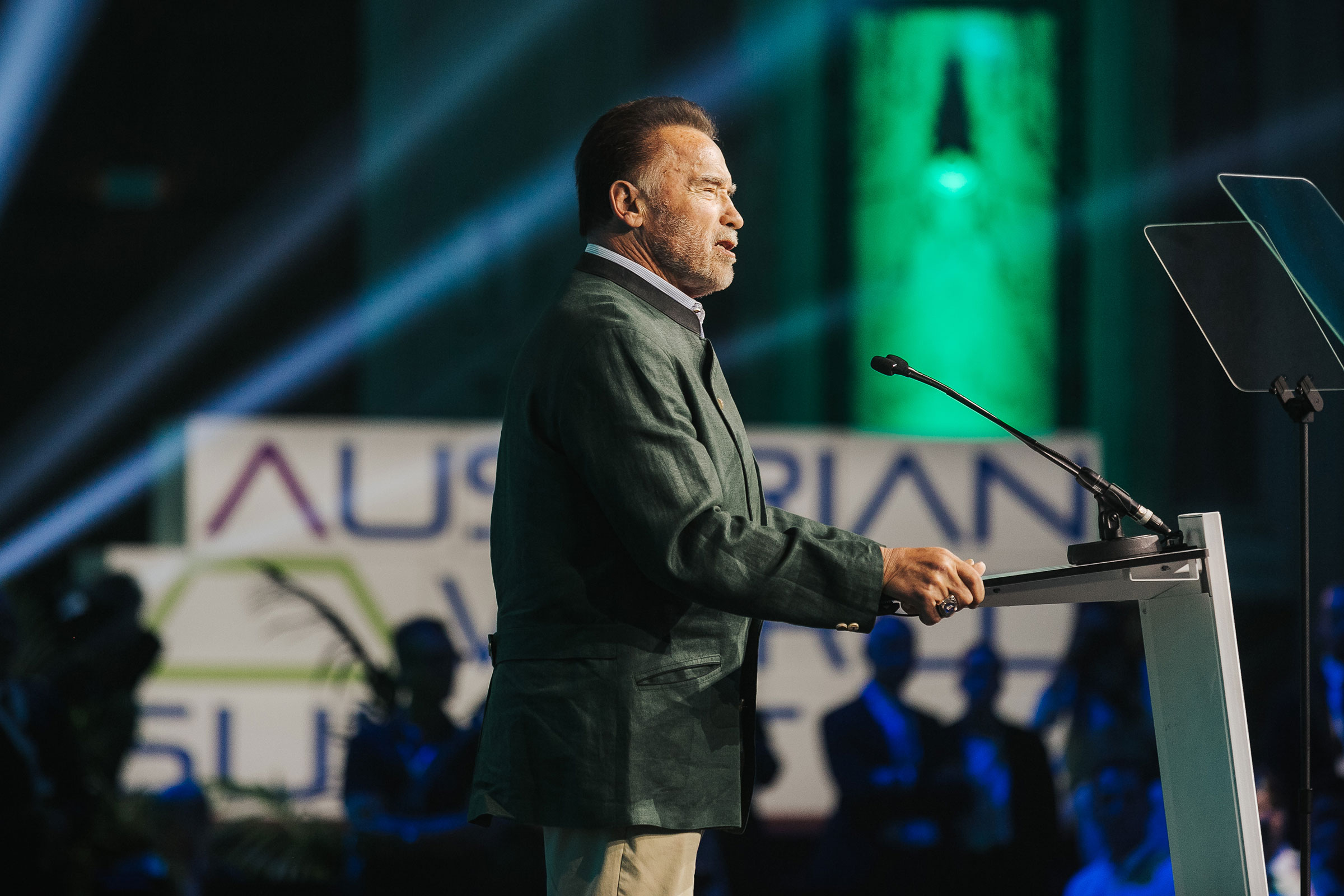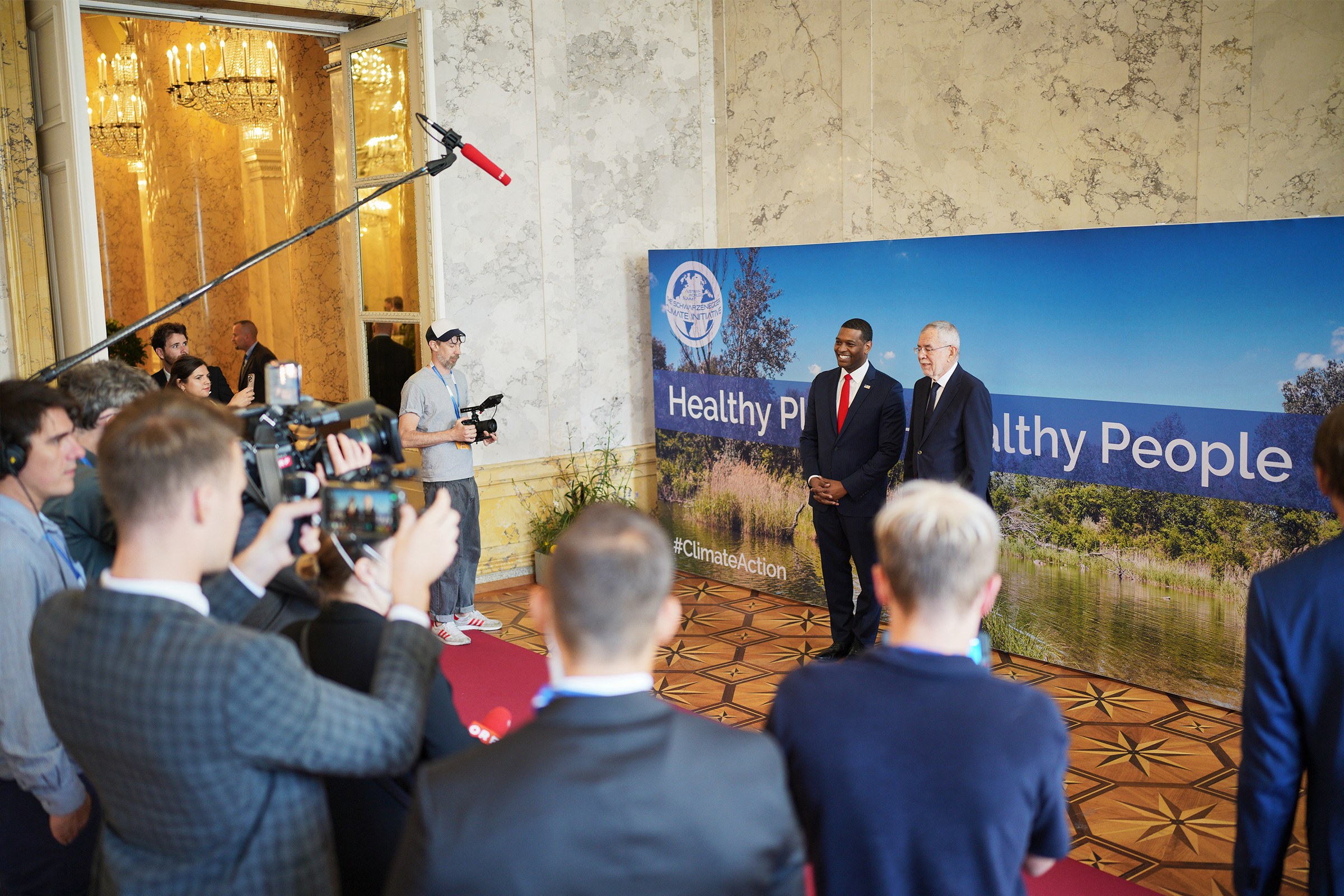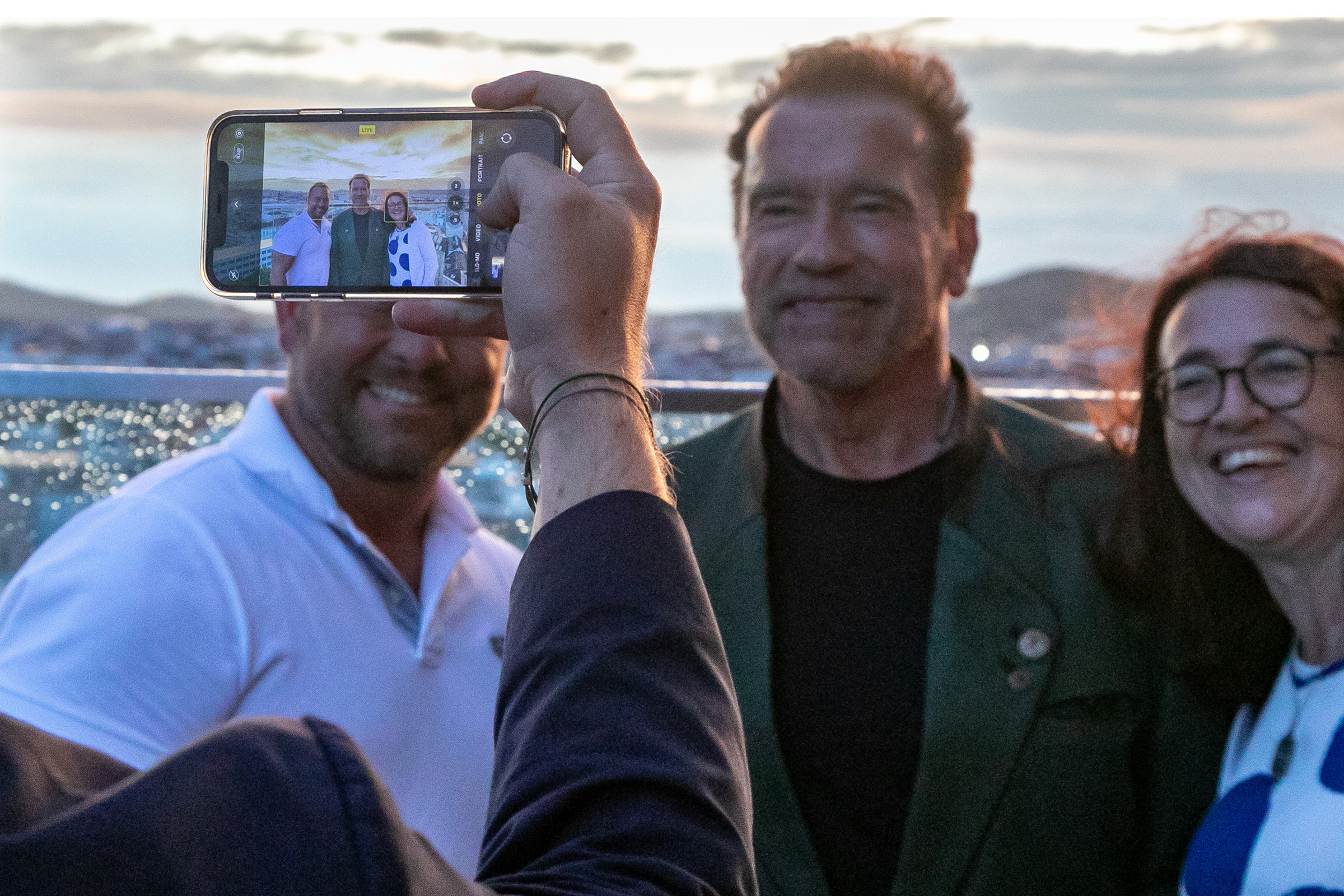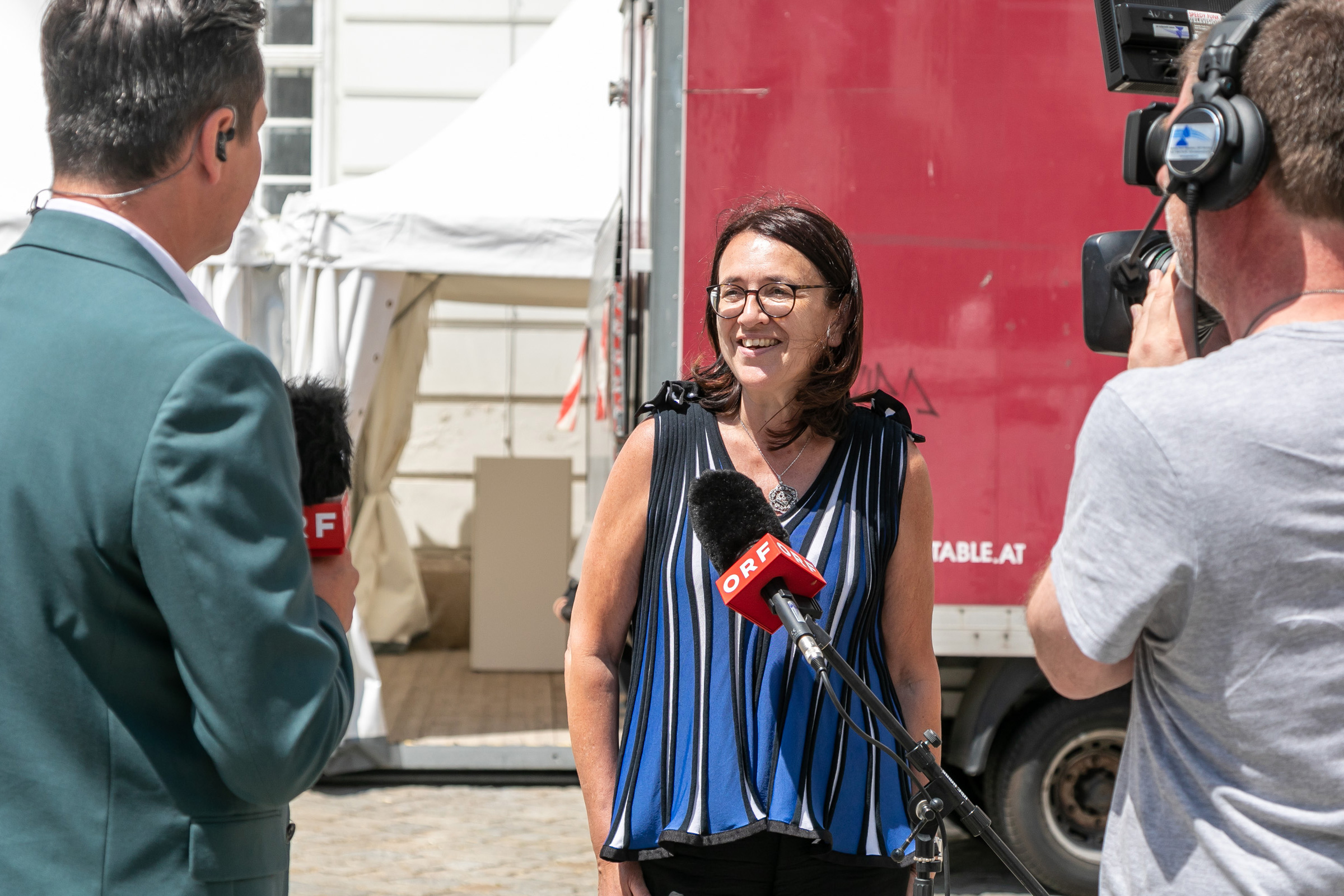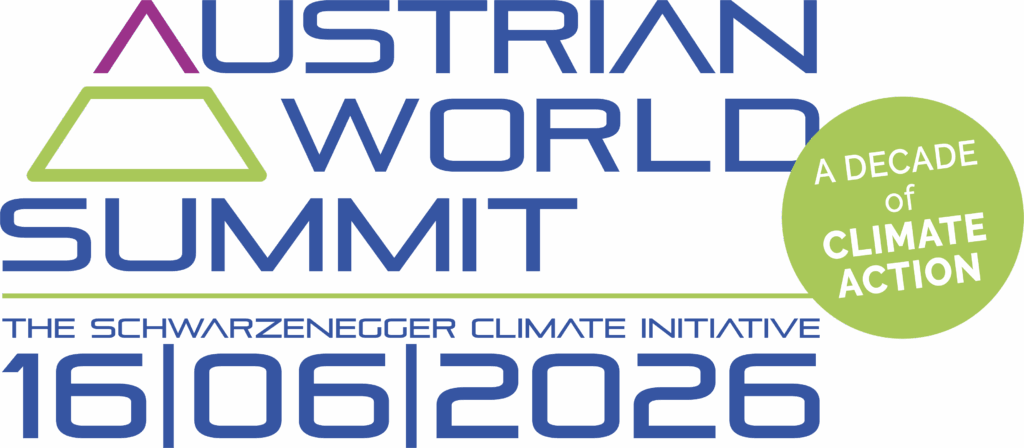Save the Date!
Join us on Tuesday, June 16, 2026, as we celebrate the 10th anniversary of the AUSTRIAN WORLD SUMMIT in the Hofburg Palace, Vienna.
Mark your calendars and be part of this special anniversary edition!
NEWS
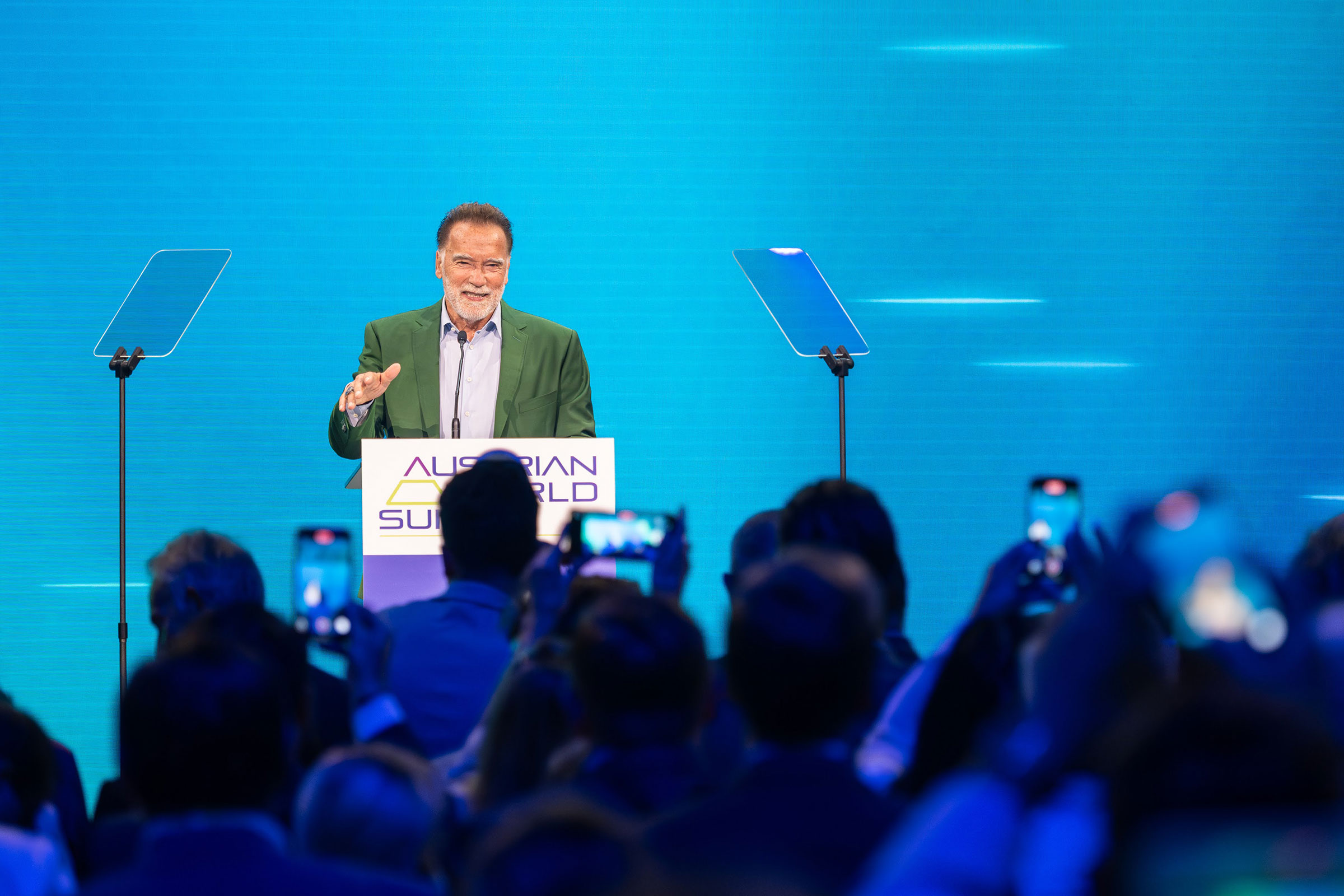
March 4, 2026
Arnold Schwarzenegger Receives One of California’s Highest Honors
A special distinction for a remarkable Austrian: Arnold Schwarzenegger will be inducted into the California Hall of Fame, an honor reserved for individuals who have shaped California and inspired generations. Few could have imagined that a young man […]

March 3, 2026
International Day of Wildlife: Why Biodiversity Matters to All of Us
Today is a reminder that protecting wildlife is not an abstract global issue: it’s something that starts right where we are. At the Wild Solutions Park, we see every day how powerful it is when people experience nature up close. When visitors walk t […]

January 26, 2026
United for Nature: Wild Solutions Park Wins the 2026 Weißwurstparty Voting
EUR 27,470 for the Nature and Environmental Protection Project in Asparn an der Zaya What can be achieved when many people share a common goal was powerfully demonstrated by the voting at the 33rd Weißwurstparty at the Stanglwirt. In 2026, this long […]
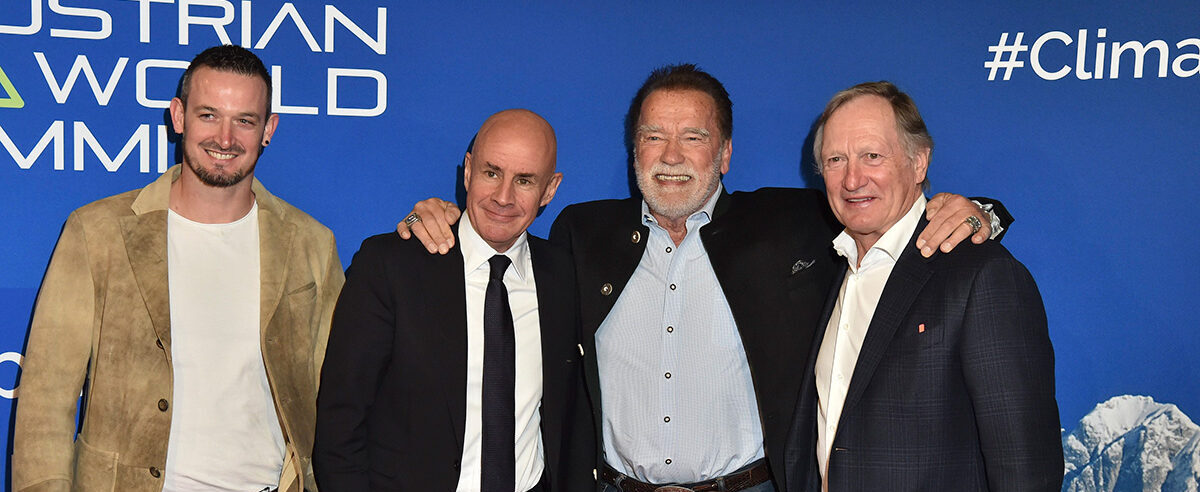
January 23, 2026
Unstoppable for the Environment: Schwarzenegger Auction Raises 1,3 Million Euros
Arnold Schwarzenegger welcomed his guests at the legendary Stanglwirt in Kitzbühel with a clear message: “The Hahnenkamm Race is all about courage, speed, and determination – the same qualities we need to protect our planet and terminate pollution. […]

January 8, 2026
Help Shape the Future of Nature: Vote for the Wild Solutions Park!
Natural landscapes are more than scenic spaces – they are living ecosystems, habitats for countless animal and plant species, places of learning, and environments where people reconnect with nature. Preserving these landscapes means safeguarding bio […]

January 7, 2026
#KeepWinterAlive: Joining Forces with FIS Athletes on Social Media
This winter, the Schwarzenegger Climate Initiative is proud to team up with the International Ski and Snowboard Federation (FIS) for the social media campaign #KeepWinterAlive. Together with FIS athletes, we’re using Instagram to spo […]
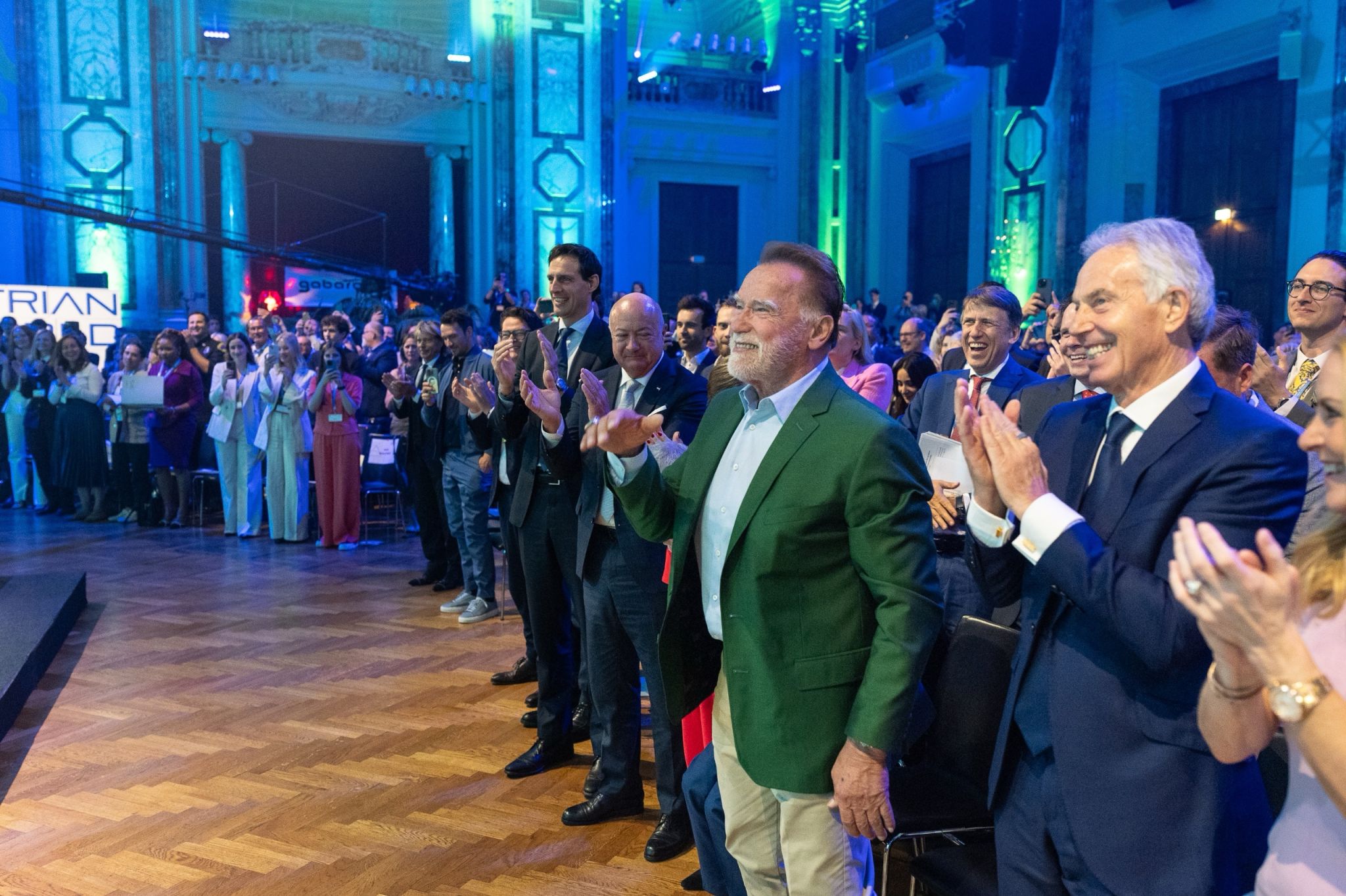
December 19, 2025
Looking Back at 2025: United in Action, Unstoppable in Impact
As we reflect on 2025, one message stands out clearly: when people come together with purpose, meaningful change becomes possible. Throughout the year, the Schwarzenegger Climate Initiative (SCI) expanded its global reach, strengthened strategic par […]

December 15, 2025
Schwarzenegger as Santa Claus
Holiday Wishes from Vienna Included. For more than three decades, Arnold Schwarzenegger has stepped into the role of Santa Claus, distributing gifts to children and families at the “Miracle on 1st Street” event at the Hollenbeck Youth Center in Los […]

November 18, 2025
A Wild Welcome at the Wild Solutions Park!
We are thrilled to announce an exciting development at the Wild Solutions Park: two water buffaloes, named Rapunzel and Schnuffel, from Schönbrunn Zoo in Vienna have recently moved into their temporary new home at the Naturpark Leiserberge! The Wild […]
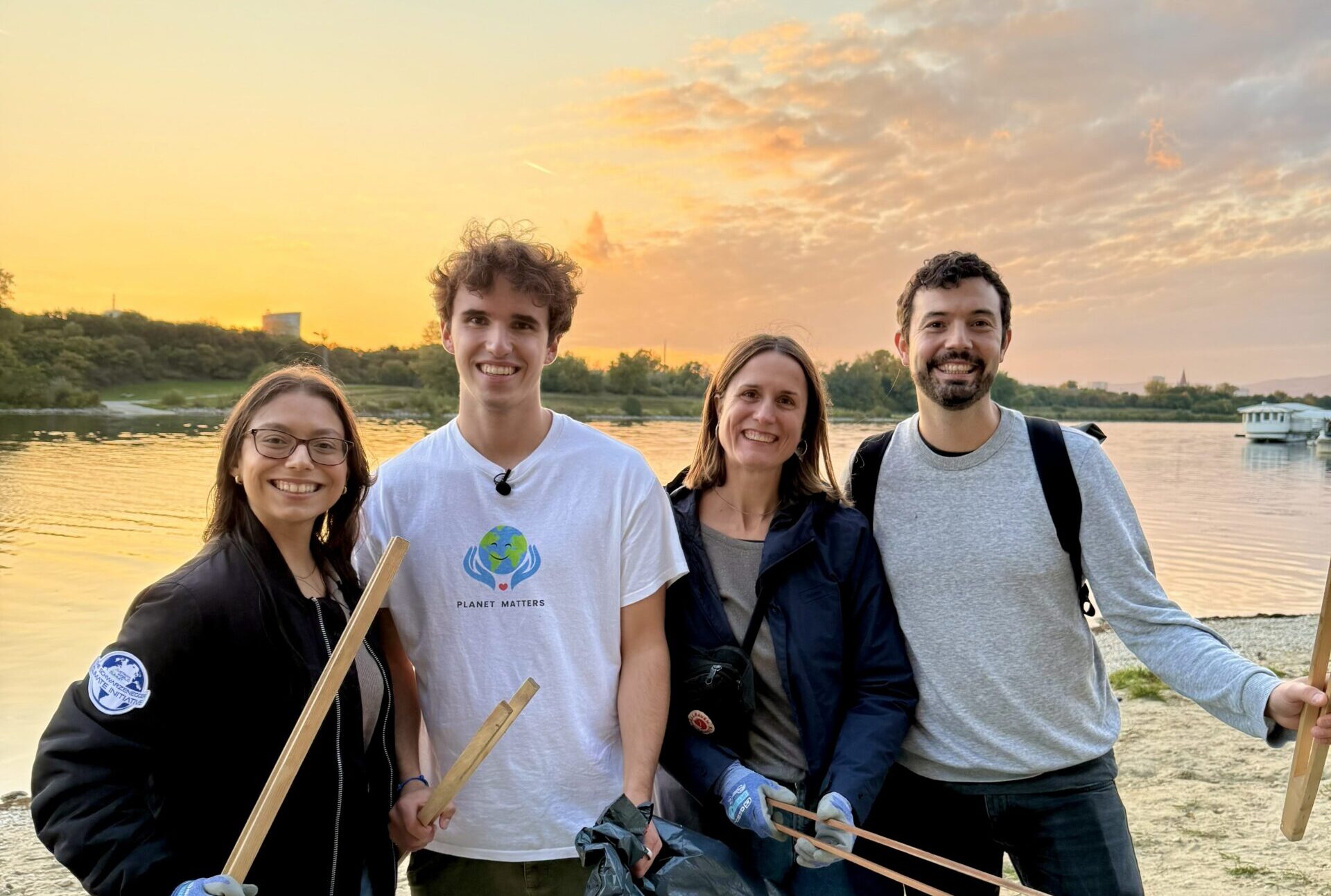
November 3, 2025
Small Actions, Big Impact: Beach Clean-Up with Planet Matters
By Melanie R Guadalaupe Social Media Manager If there is one thing I’ve learned at the Schwarzenegger Climate Initiative; when Felix calls, you answer. You never quite know what adventure he has planned next. You’re probably lost— let me start again […]
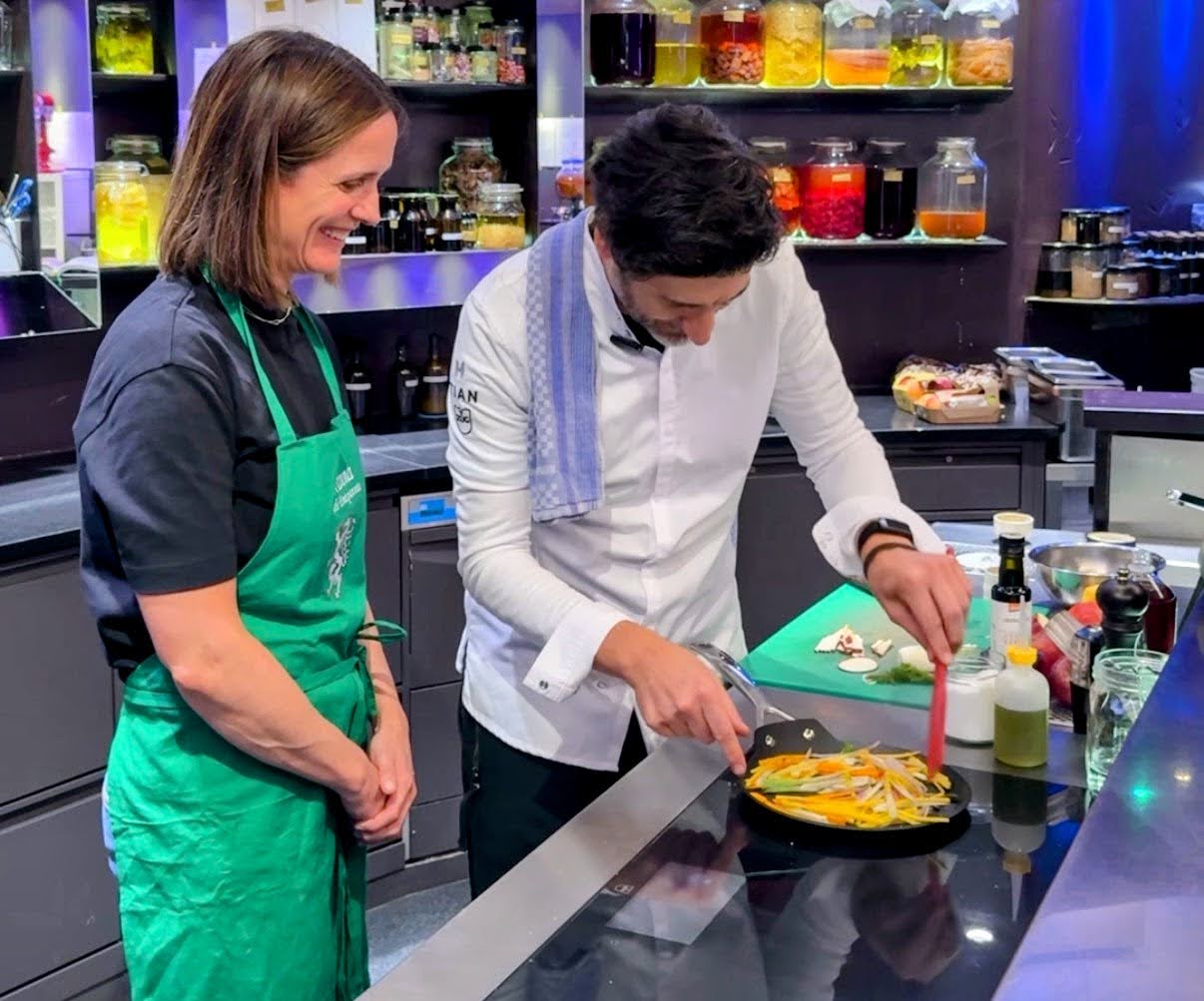
October 31, 2025
How Michelin-Starred Chef Paul Ivić Turns Food into Climate Action
When we visited Michelin-starred chef Paul Ivić at his famous vegetarian restaurant TIAN in Vienna, he welcomed us into his kitchen enthusiasm. From the moment the olive oil hit the pan, and the scent of roasted pumpkin began to fill the air, it was […]

October 30, 2025
Are the Danes onto something?
By Hanna Zedlacher Head of Progams Have you ever heard of panda diplomacy? In short, China has been sending giant pandas to different countries as a tool of diplomacy. But, have you ever come across the term “plant-based diplomacy?” Well, you might […]

October 22, 2025
Arnold’s Special Dinner for Climate Action: In three months, it’s that time again!
Arnold Schwarzenegger once again invites guests to the “Special Dinner for Climate Action” at the Stanglwirt. In just three months – on January 22, 2026 – Arnold Schwarzenegger will personally host his charity gala, the “Special Dinner for Climate A […]

October 14, 2025
Go Nuts
By Hanna Zedlacher Head of Programs How do you know if someone is vegan? Don’t worry, they’ll tell you within the first 2 minutes of meeting them. In my case… it just took you about 10 seconds. I have been eating fully plant-based for more than 10 y […]
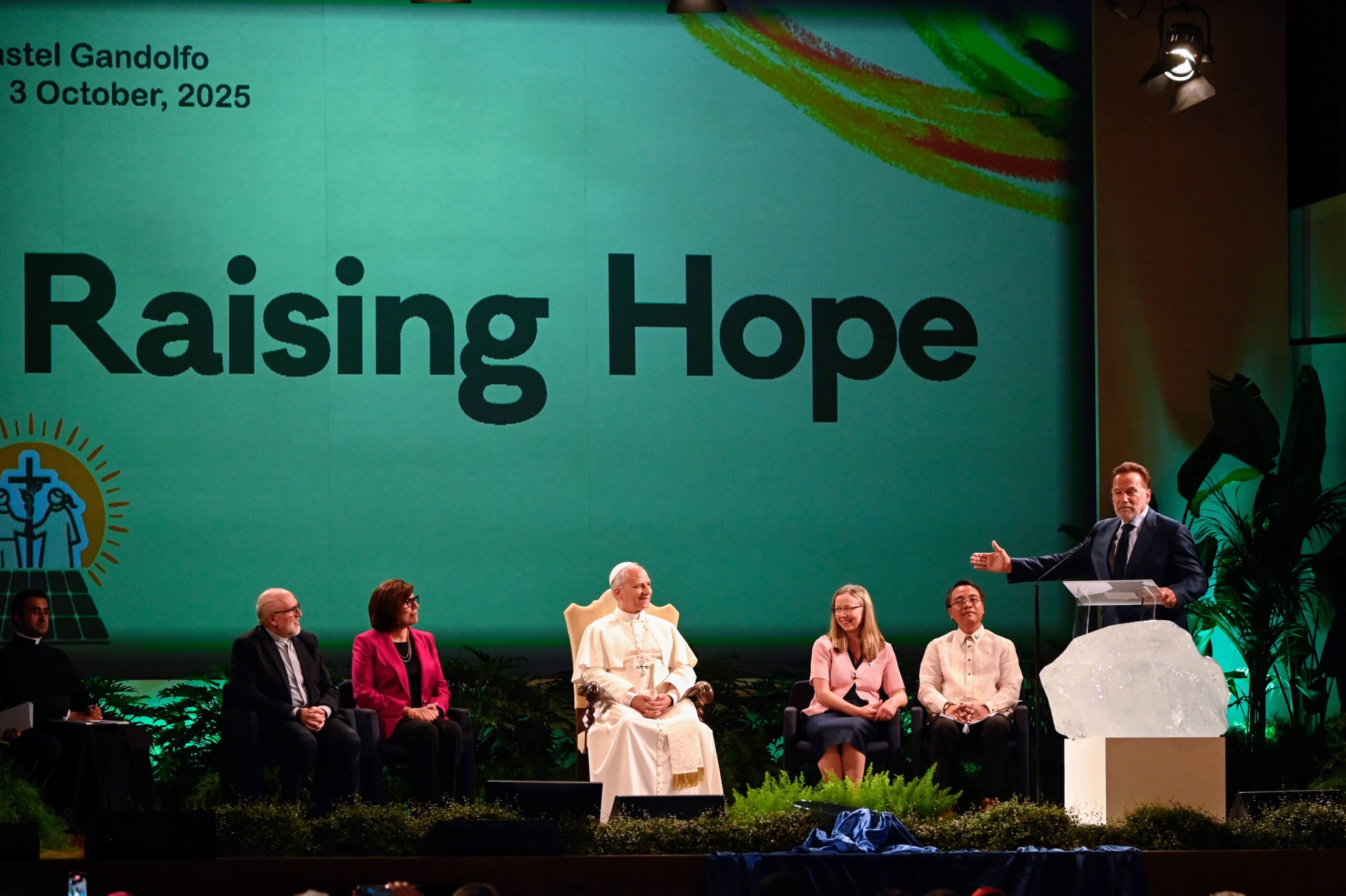
October 1, 2025
Schwarzenegger meets Pope Leo XIV at Raising Hope Conference
Castel Gandolfo, 1 October 2025 – Today, Arnold Schwarzenegger, founder of the Schwarzenegger Climate Initiative, met with Pope Francis during the opening of the international conference “Raising Hope for Climate Justice” in Castel Gandolfo (Italy). […]

September 30, 2025
Arnold Schwarzenegger at Vatican Press Conference on Climate Justice
Rome, 30 September 2025 – Arnold Schwarzenegger, founder of the Schwarzenegger Climate Initiative, participated today in a Vatican press conference presenting the upcoming international conference “Raising Hope for Climate Justice.” The press confer […]
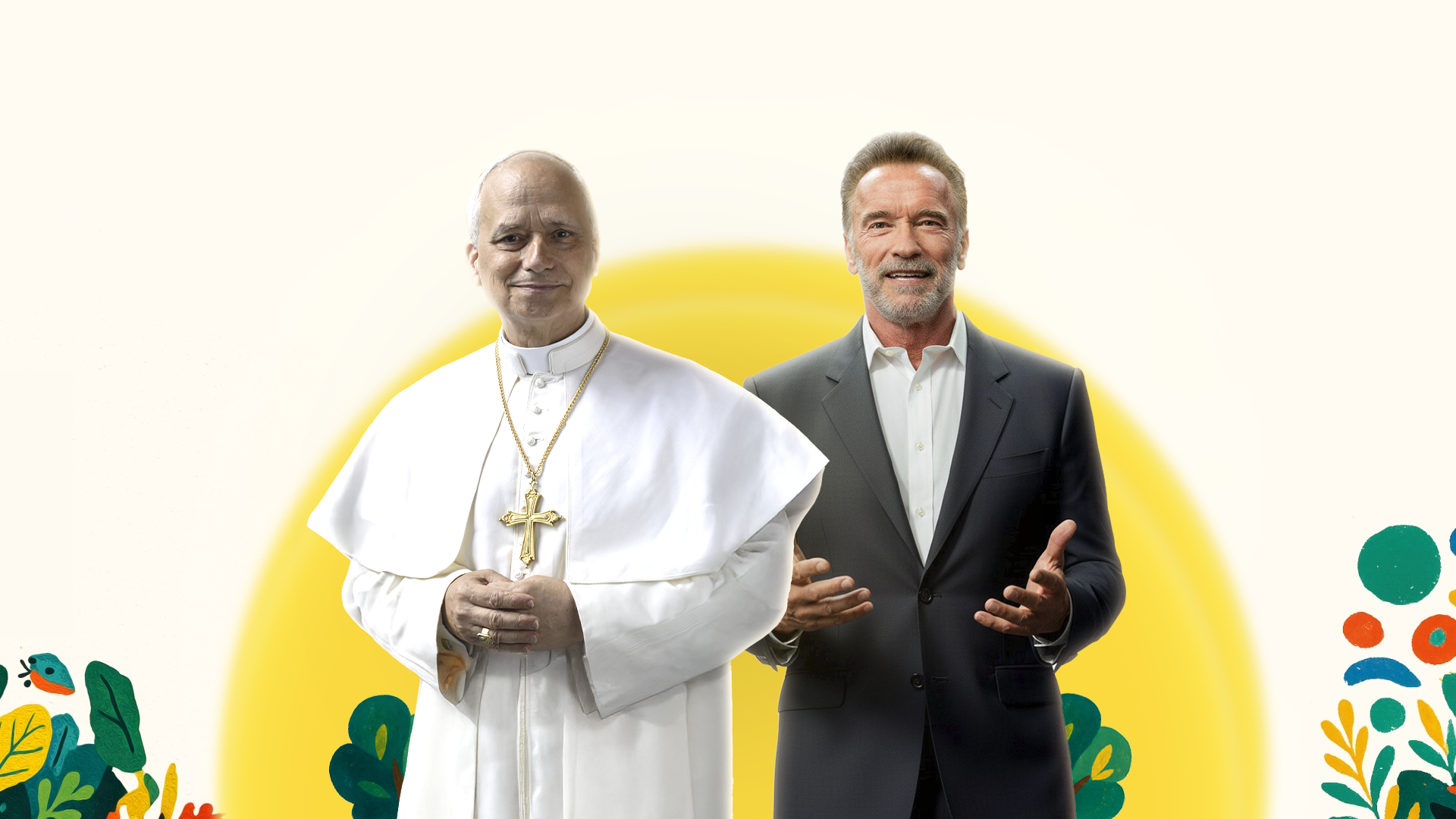
September 29, 2025
Arnold Schwarzenegger meets Pope Leo XIV this week
UNITE IN ACTION for a Healthy Planet! Vienna / Los Angeles / Vatican City – This week marks a historic moment for climate action: Arnold Schwarzenegger is personally meeting Pope Leo XIV at the Vatican. For the first time, Pope Leo XIV is dedicating […]
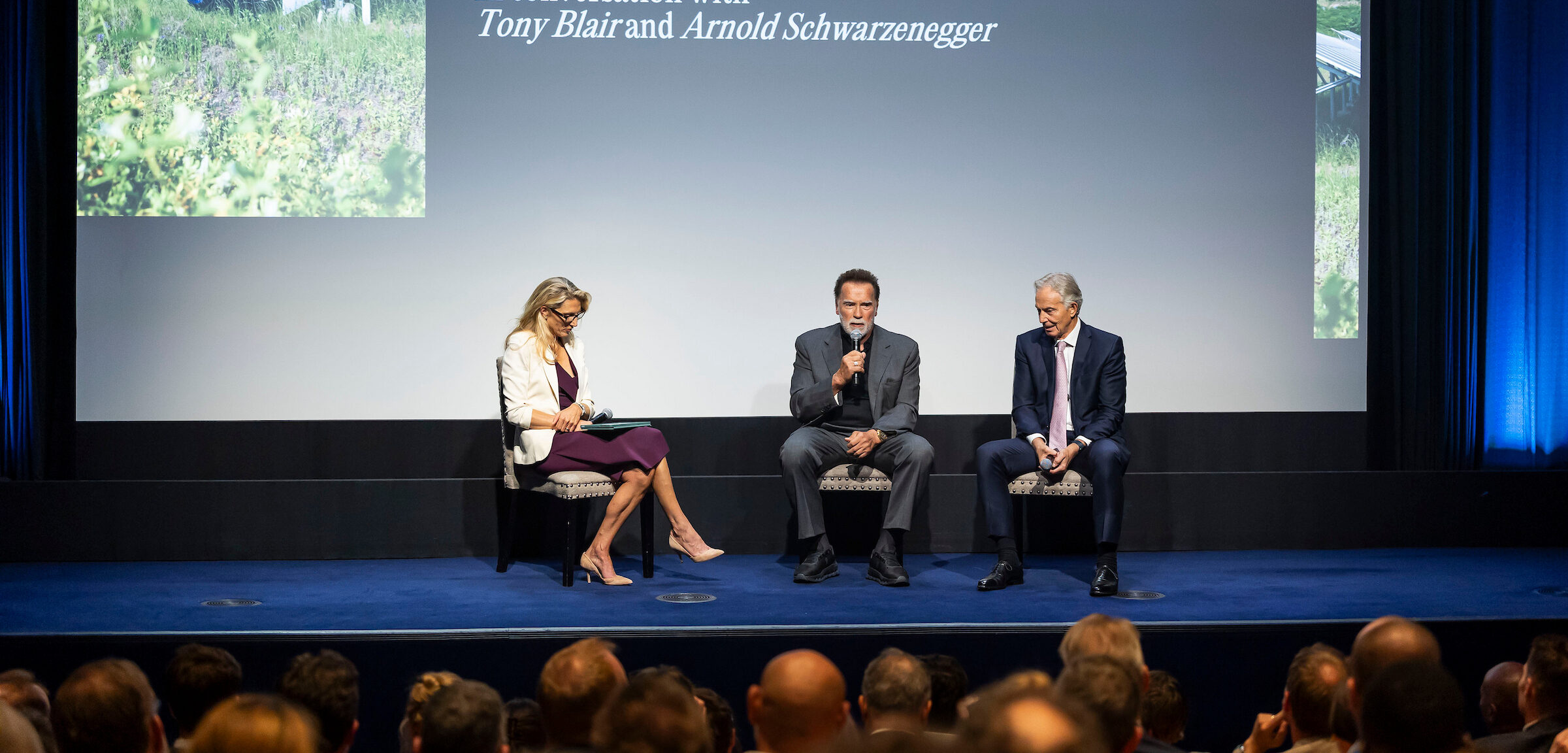
September 25, 2025
Schwarzenegger Climate Initiative Champions “Climate Superpowers” at New York Climate Week
Event unites global leaders to harness communication, innovation, and nature for effective climate solutions Vienna / New York How can the three Climate Superpowers—communication, technological innovation, and the power of nature—drive bold action t […]
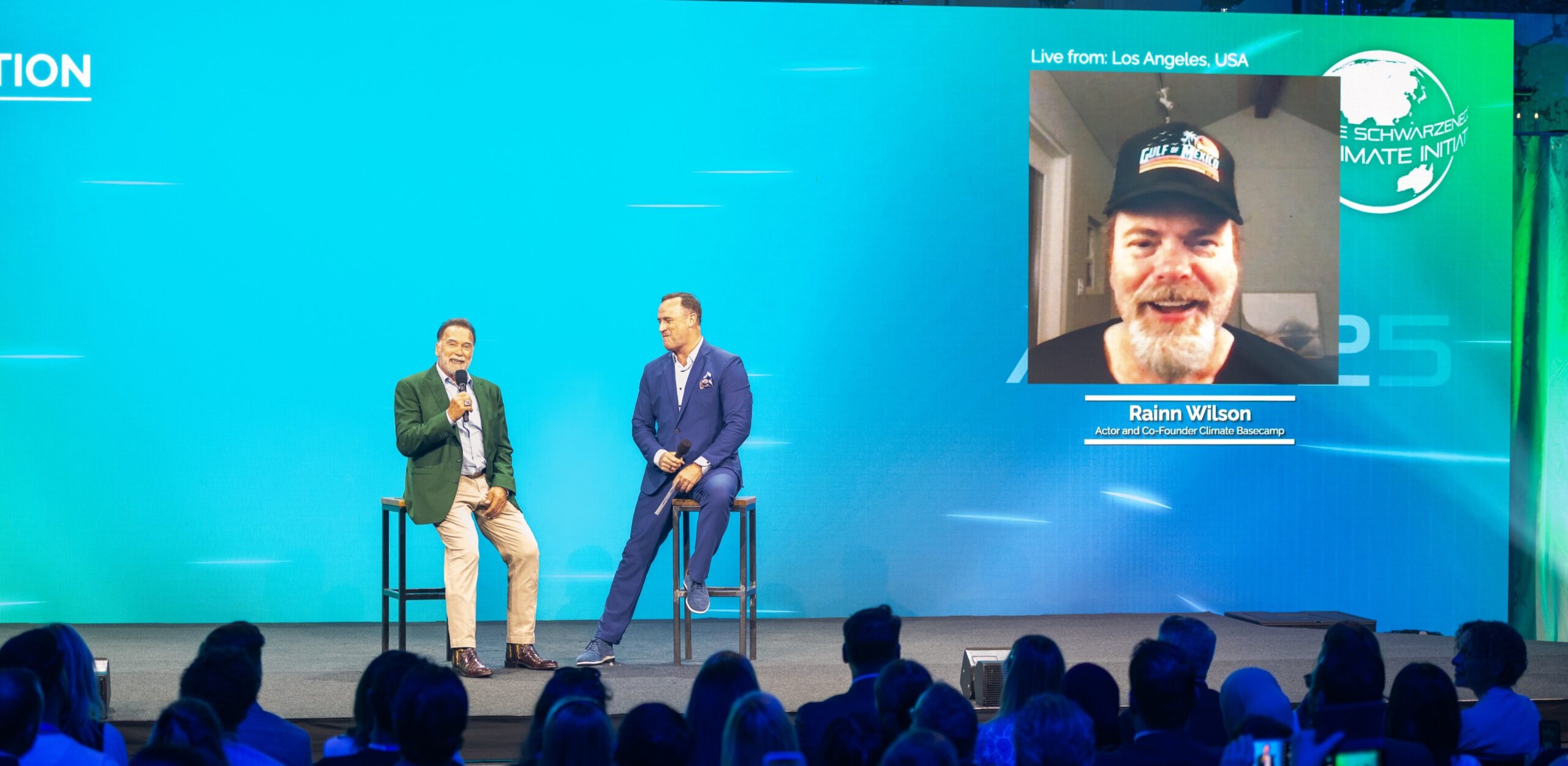
September 23, 2025
Rainn Wilson at Climate Week NYC: Moving from Crisis to Hope
Monika Langthaler, Director of the Schwarzenegger Climate Initiative, took part in the Climate Week NYC event “A Reality Check: Moving from Crisis to Hope” on September 22, 2025. The discussion took place aboard the Fortescue Green Pioneer, the worl […]
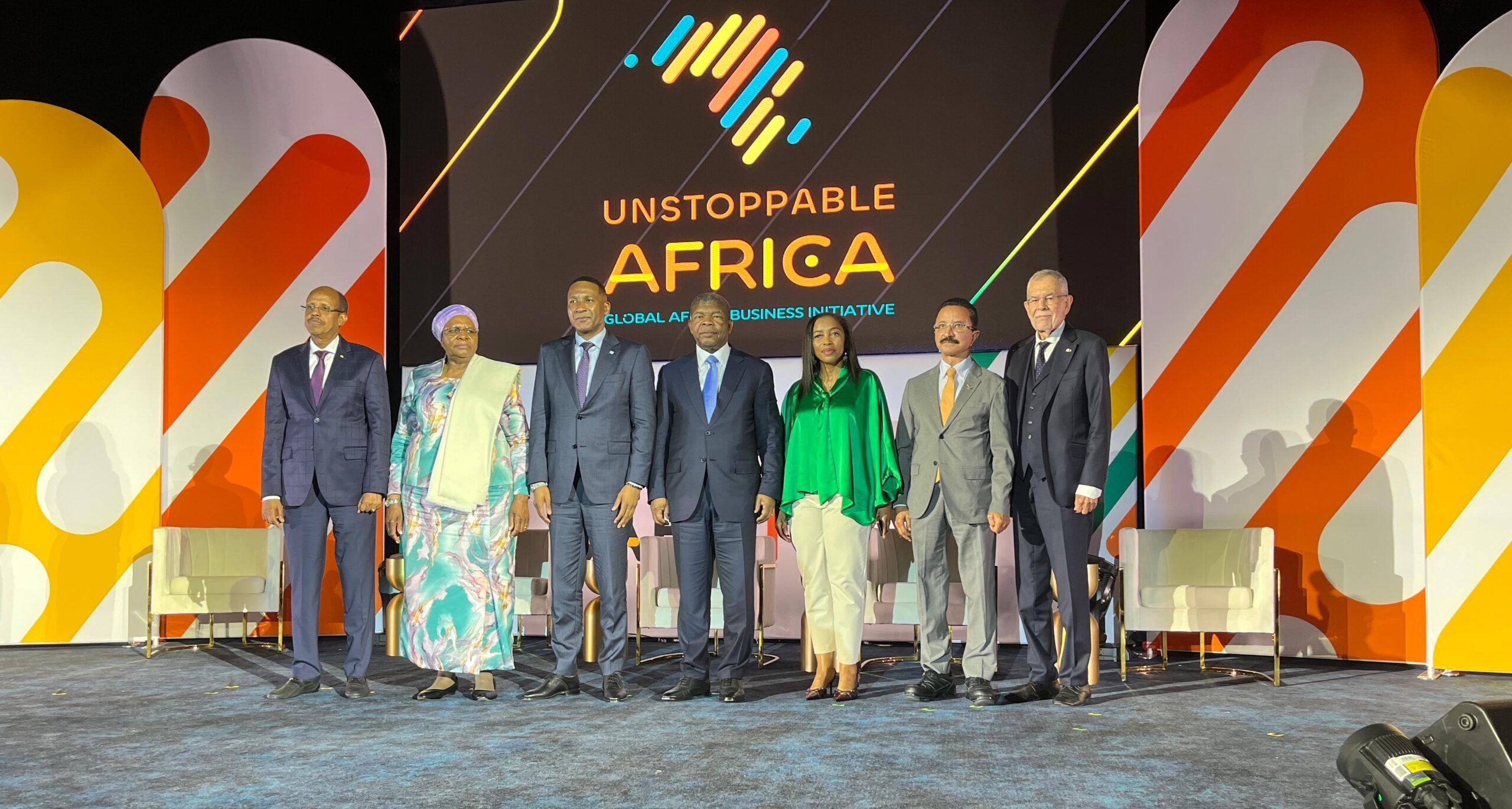
September 22, 2025
SCI at Climate Week New York City
This week, the Schwarzenegger Climate Initiative has the privilege of being part of the Climate Week NYC, which takes place alongside the United Nations General Assembly (UNGA). On September 21, SCI-Director Monika Langthaler attended #UnstoppableAf […]
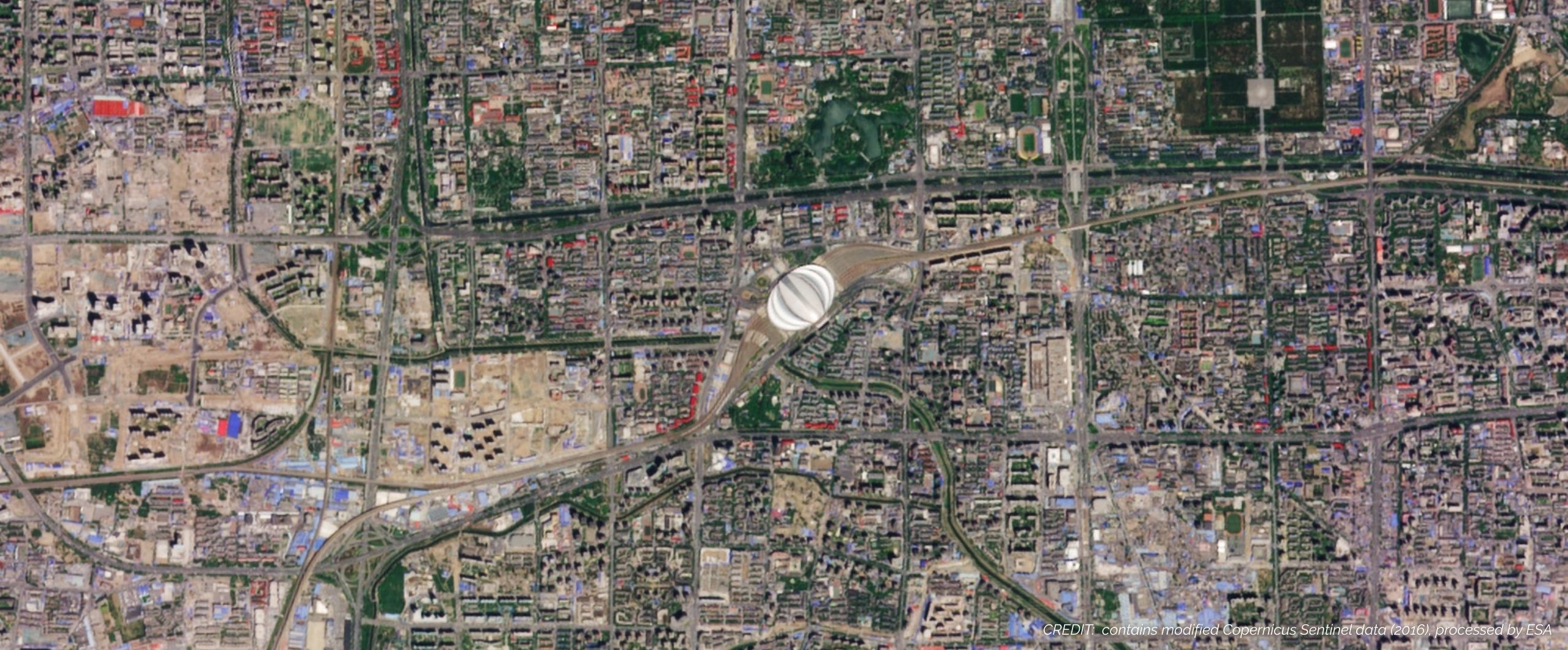
September 2, 2025
But what about China?!
By Hanna Zedlacher Head of Programs We have been hearing that we need to act, to decarbonize and to use clean energy in order to cut down our emissions. Change never comes easy; actually, change very often feels deeply uncomfortable. A common r […]

August 18, 2025
Schwarzenegger Kicks Off New NBC Podcast Series on Pollution and Climate Action
We are proud to share that Arnold and the Schwarzenegger Climate Initiative are featured in the very first episode of NBC’s new podcast series Predictable with Meteorologist Chase Cain. In this debut episode, Arnold speaks openly about the dangers o […]
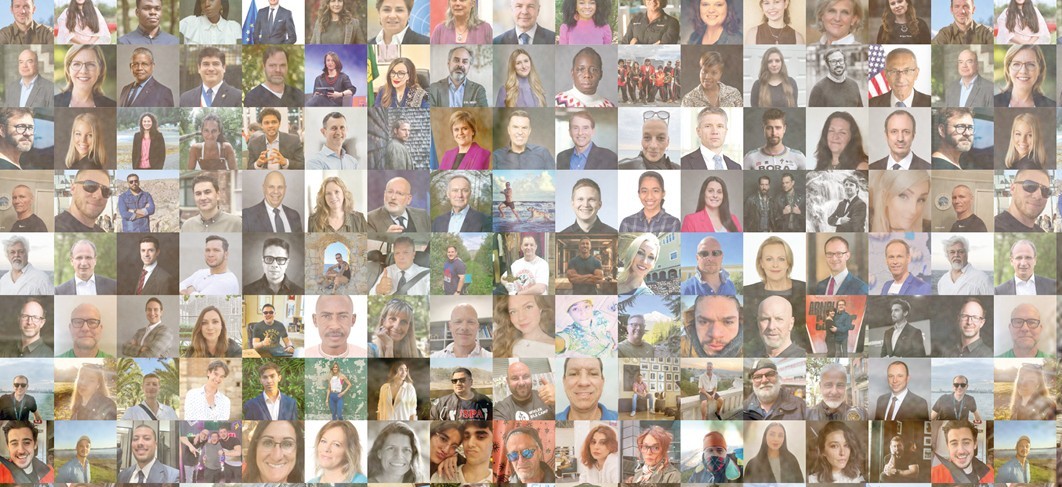
June 9, 2025
UNITE IN ACTION MOSAIC
Over the past few weeks, we invited our followers to send in their photos for a special mosaic project — and hundreds of people responded. We’re incredibly grateful for each and every submission! The final mosaic is featured as the cover of this yea […]

May 27, 2025
The BossHoss & Arnold Schwarzenegger: “I’ll Be Back” for Climate Action
Out May 30 – Pre-save now When passionate rock meets real power, something special happens: the well-known band The BossHoss is taking a stand for climate protection with their new single “I’ll Be Back” and they’re getting high-profile support from […]

April 22, 2025
Pump for the Planet 2025
We engage in exercise to strengthen our bodies and enrich our health. However, beyond our personal wellness, the vitality of our environment is equally essential to our collective well-being. Therefore, it is imperative for each of us to actively en […]
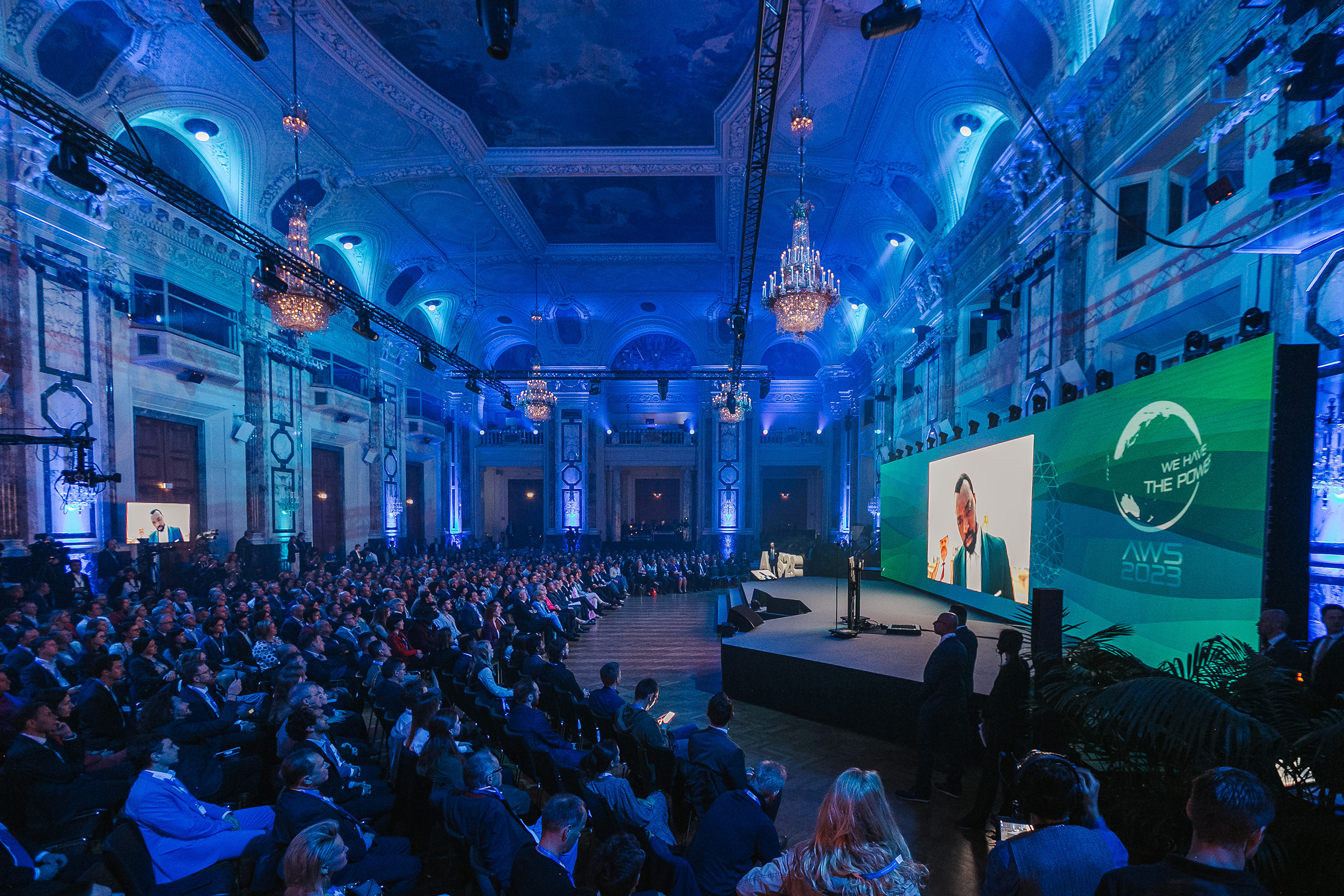
March 6, 2025
AUSTRIAN WORLD SUMMIT 2025 – Registration Opens on April 23!
Free Tickets & Exclusive Business Tickets Available At the AUSTRIAN WORLD SUMMIT, we believe that climate action should be accessible to everyone. That’s why participation in the Summit, like previous years, remains free of charge. Due to limite […]

March 4, 2025
Join us in making history!
This year, we’re creating a powerful mosaic made up of YOU—our global community of climate warriors. Together, we will show that action knows no borders. 📸 Want to be part of it? Here’s how: 1️⃣ Send us your photo via WhatsApp to +43-1/2351423 or Em […]

January 30, 2025
AUSTRIAN WORLD SUMMIT 2025 – June 3 in Vienna
Arnold Schwarzenegger invites under the motto “UNITE IN ACTION – TERMINATE POLLUTION” to the Vienna Hofburg On June 3, 2025, Vienna will once again host one of the world’s most significant climate protection conferences, the AUSTRIAN WORLD SUMMIT (A […]

January 27, 2025
37,000 Euros for the Tyrolean Mountain Rescue
A Victory for Our Mountains and a Healthy Planet In an inspiring joint initiative, the Schwarzenegger Climate Initiative and the Tyrolean Mountain Rescue have secured €37,000 through a public vote. The funds, generously sourced from the donation poo […]
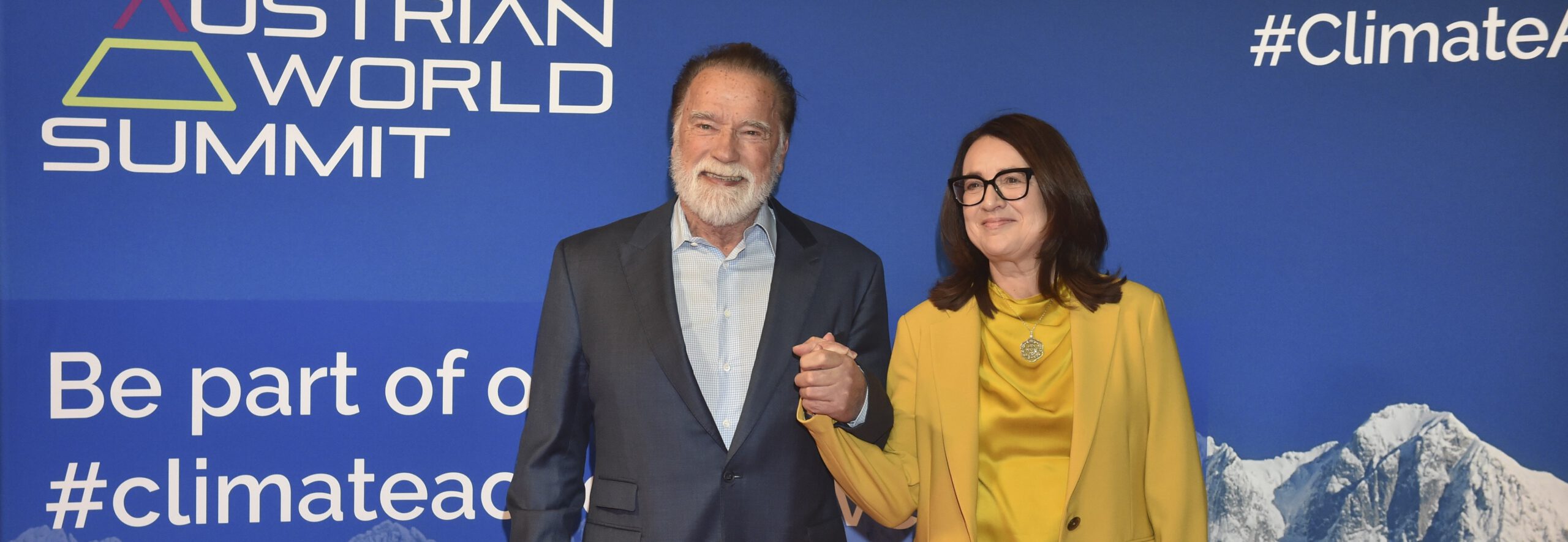
January 24, 2025
Schwarzenegger Climate Initiative Auction: Record-Breaking €1.55 Million Raised for the Environment
300,000 Euros donated to the Los Angeles Fire Department “In times that challenge us greatly, it is crucial that we gather together once again to stand for the protection of our planet and a healthier future for all. But let me be clear: my mind rem […]

January 15, 2025
Together with the Schwarzenegger Climate Initiative: For Our Mountains and a Healthy Planet
The mountains, synonymous with Tyrol, shape not only our cultural landscape and the habitat of many unique animal and plant species but also serve as a refuge for those seeking relaxation and as an arena for outdoor enthusiasts. Recognizing their im […]
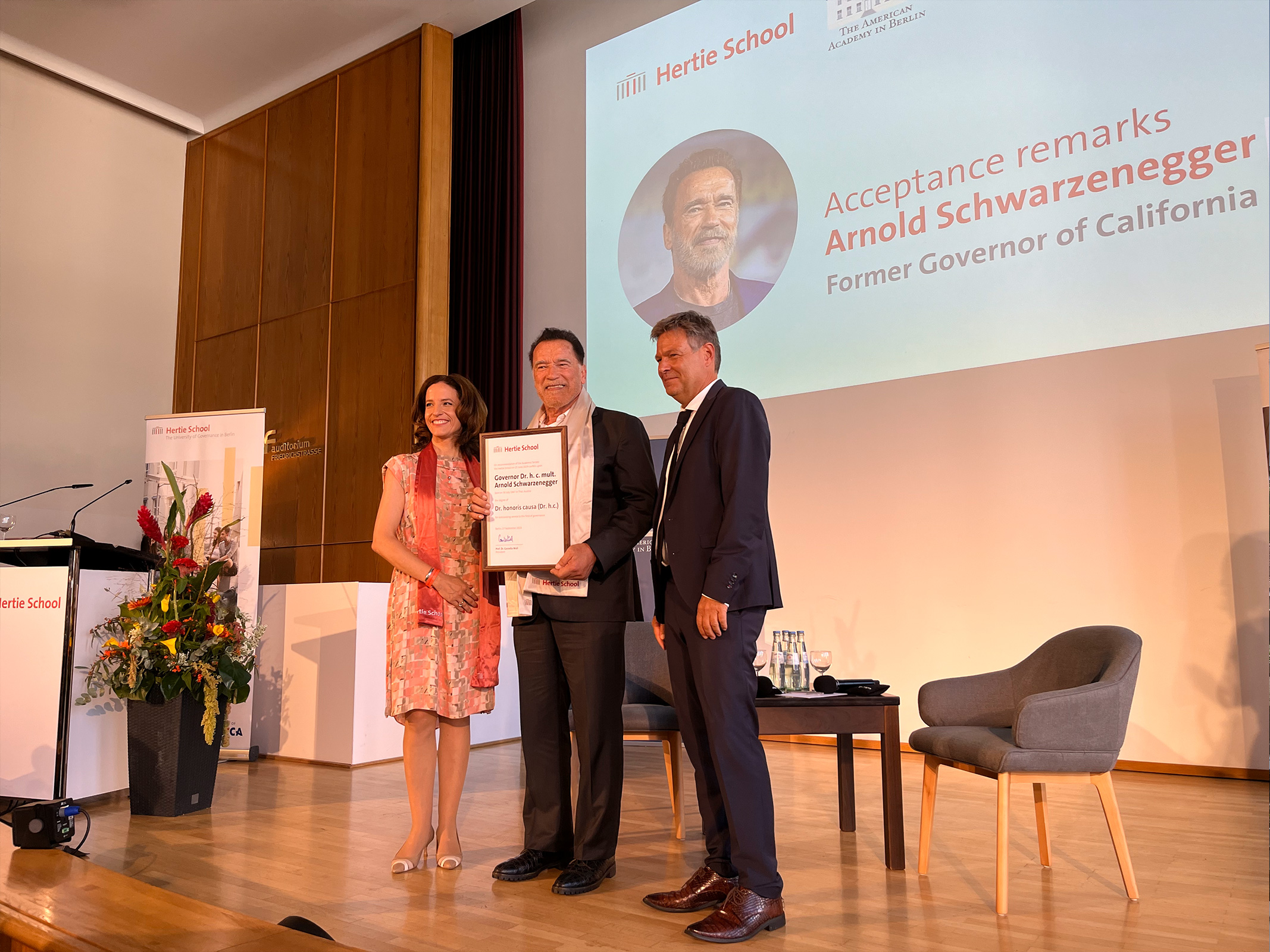
September 19, 2024
Arnold Schwarzenegger Awarded Honorary Doctorate
Recognition for commitment to climate protection and civic engagement Arnold Schwarzenegger has been awarded an honorary doctorate from the Berlin Hertie School in recognition of his significant contributions to governance and climate action. We are […]
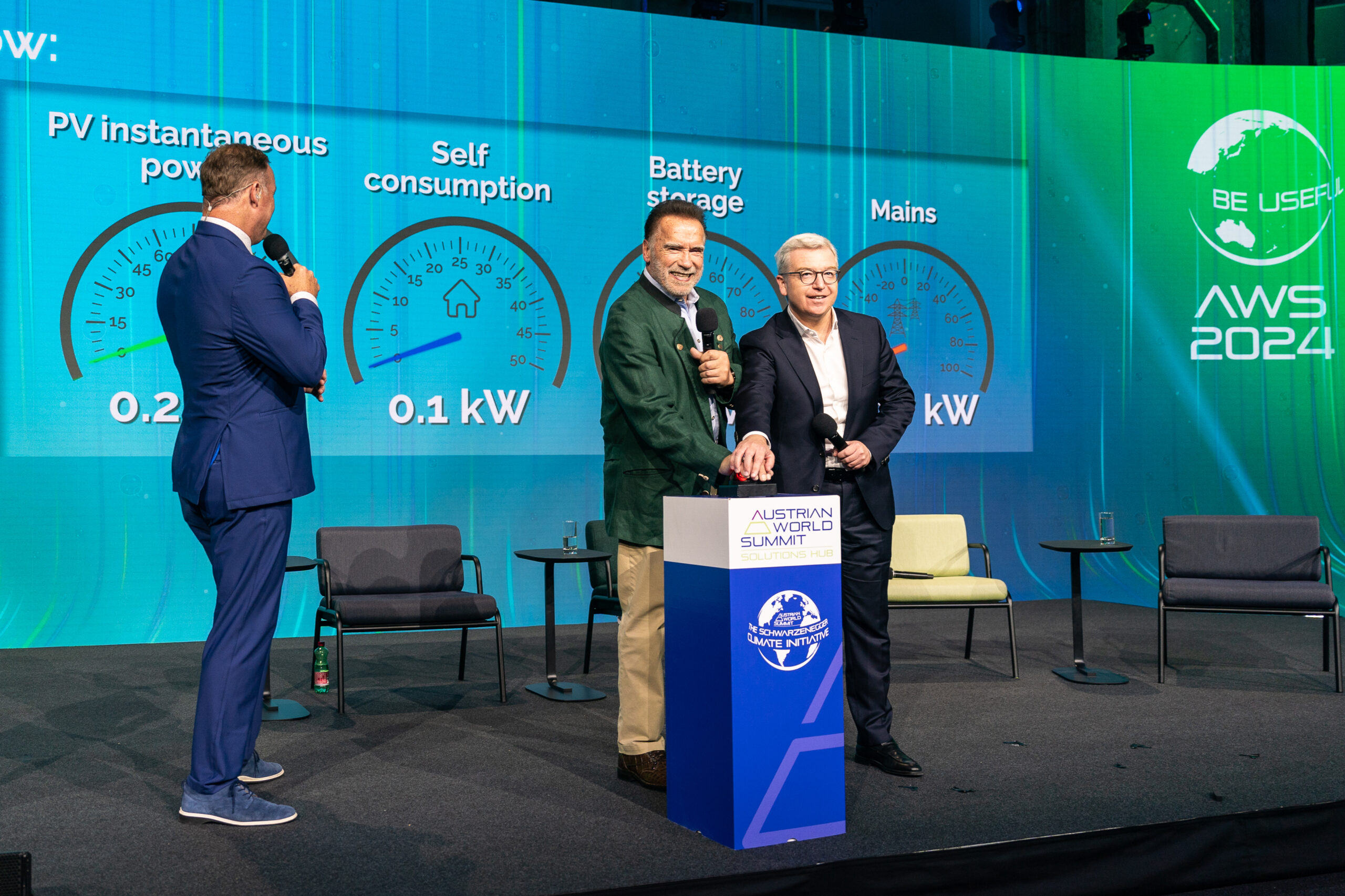
July 2, 2024
The Schwarzenegger Climate Initiative and Raiffeisen NÖ-Wien Join Forces for More Climate Protection
The AWS Solutions Hub in Asparn/Zaya has launched an innovative energy cooperative in the Weinviertel region together with Raiffeisen. Regional, sustainable electricity is available at fair prices for anyone who wants to join in. On Friday, June 21, […]
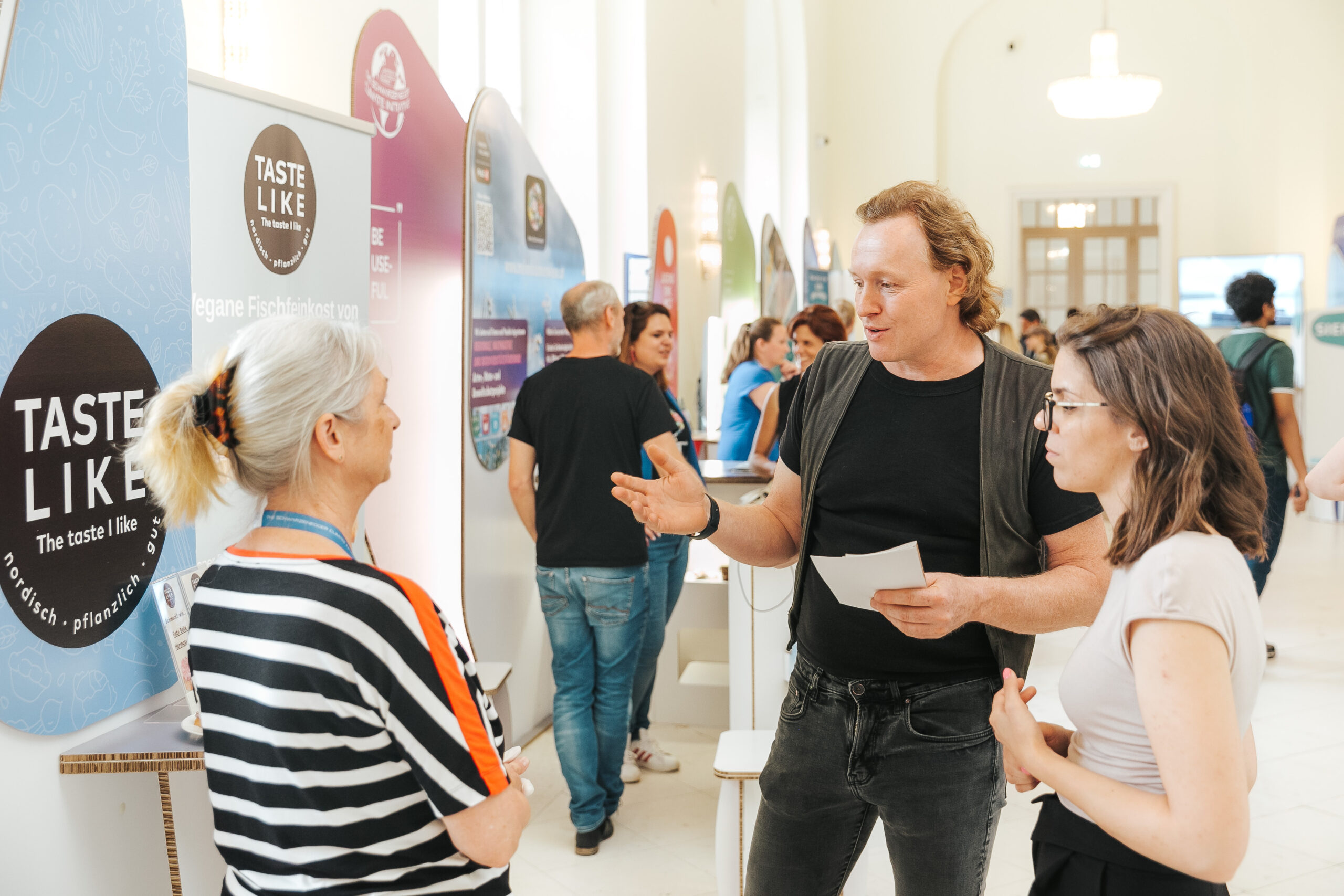
June 20, 2024
Schwarzenegger’s Environmental Fair Draws Large Crowds
Successful Launch: 3,500 Visitors Attend Arnold Schwarzenegger’s AWS Solutions Expo at Vienna Hofburg On Thursday, Arnold Schwarzenegger’s new AWS Solutions Expo made a successful debut, drawing 3,500 visitors to the Vienna Hofburg. Each year, Schwa […]
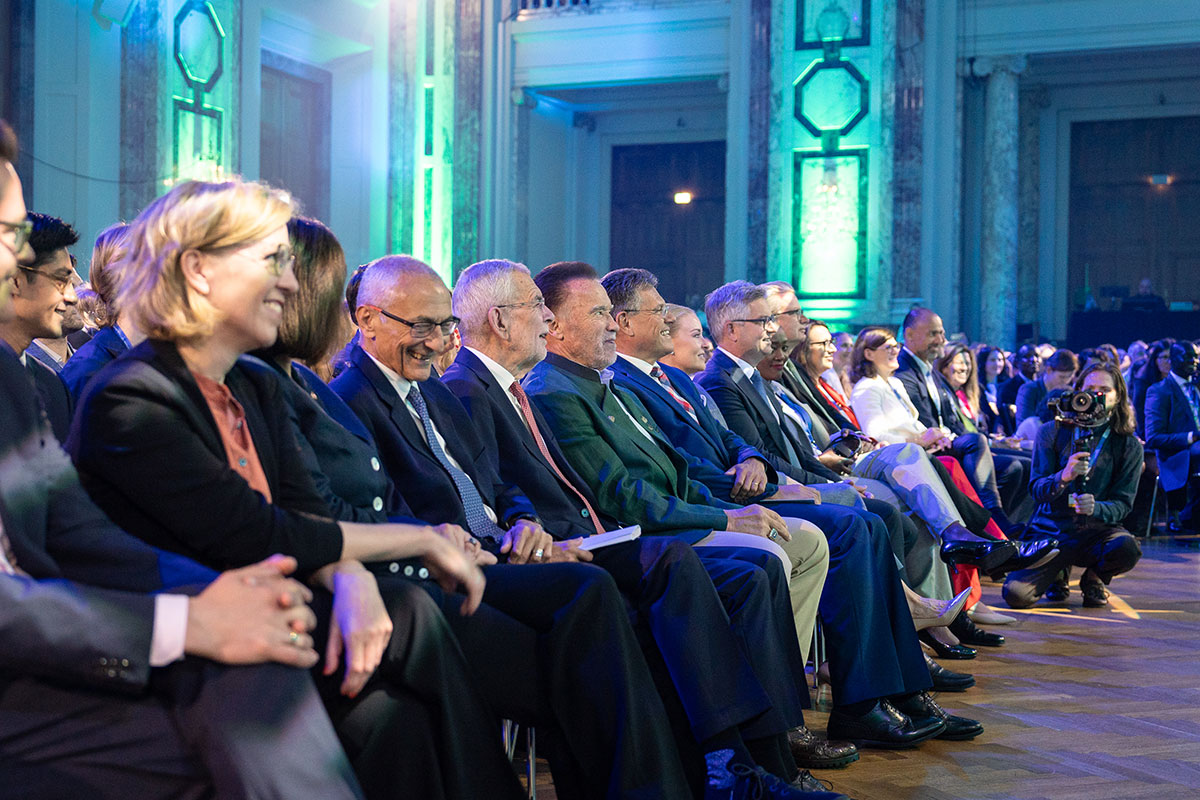
June 20, 2024
Kicking Ass for a healthy planet -Schwarzenegger for less talk and more action
At the eighth AUSTRIAN WORLD SUMMIT, Schwarzenegger criticized the bureaucracy and red tape that is slowing down progress towards a clean future. At the eighth AUSTRIAN WORLD SUMMIT, which took place in Vienna’s Hofburg Palace on June 20th, host Arn […]
June 3, 2024
AUSTRIAN WORLD SUMMIT 2024 Welcomes High-Profile International Guests
President of the European Commission Ursula von der Leyen and Senior Advisor to the US-President for International Climate Policy John Podesta accept Schwarzenegger’s invitation to Vienna. (Vienna, June 3rd, 2024) Environmentalists from around the w […]

May 6, 2024
Arnold Schwarzenegger extends invitation to “Pump for the Planet”
Countdown to the AUSTRIAN WORLD SUMMIT 2024: The Ultimate Workout for the Environment Arnold Schwarzenegger is inviting people to join him for a workout starting Monday. This time, however, it isn’t for a typical workout aimed at building muscle str […]
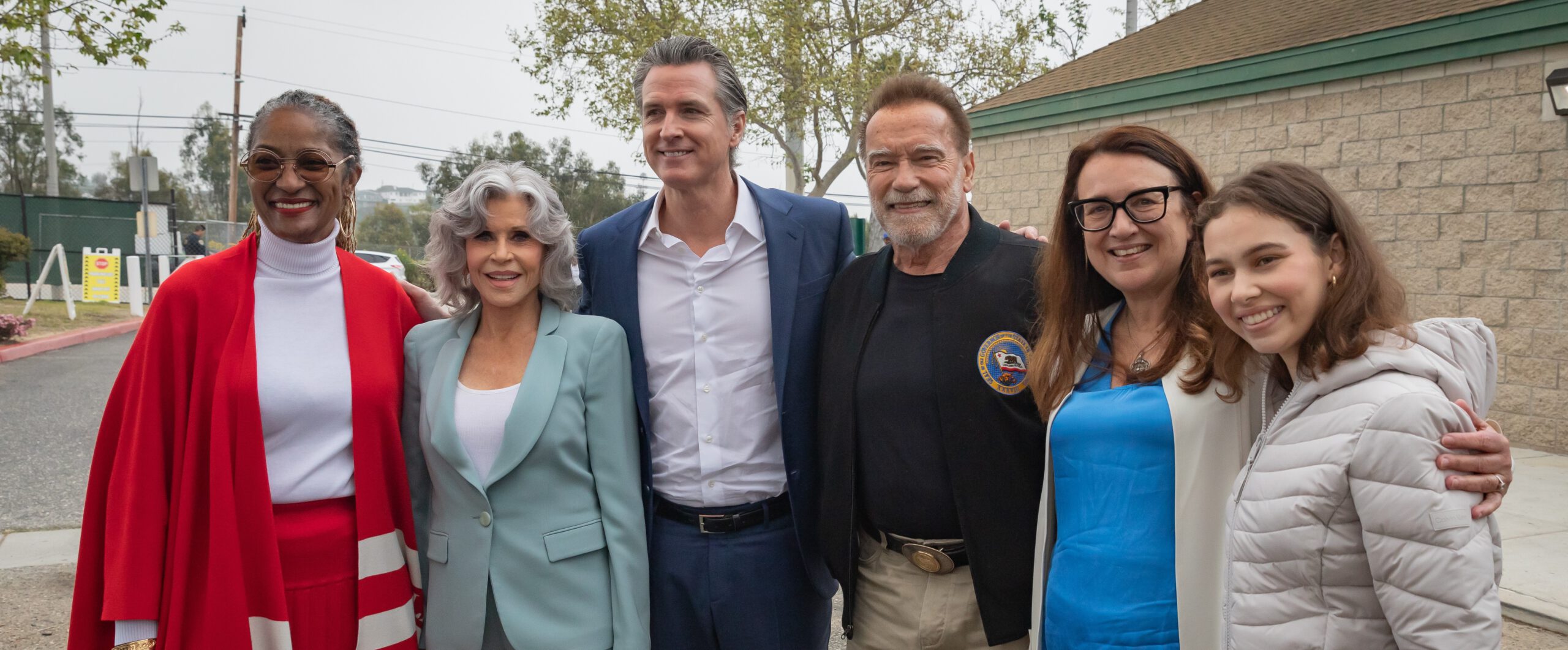
March 23, 2024
Arnold Schwarzenegger, Jane Fonda, and Monika Langthaler Unite Against Big Oil
Los Angeles, March 23, 2024 – As the U.S. elections loom on November 5th, California faces a pivotal environmental referendum. The 2022 enacted law (SB1137) regulates oil and gas drilling, prohibiting new drilling within a 3,200-foot radius (approxi […]
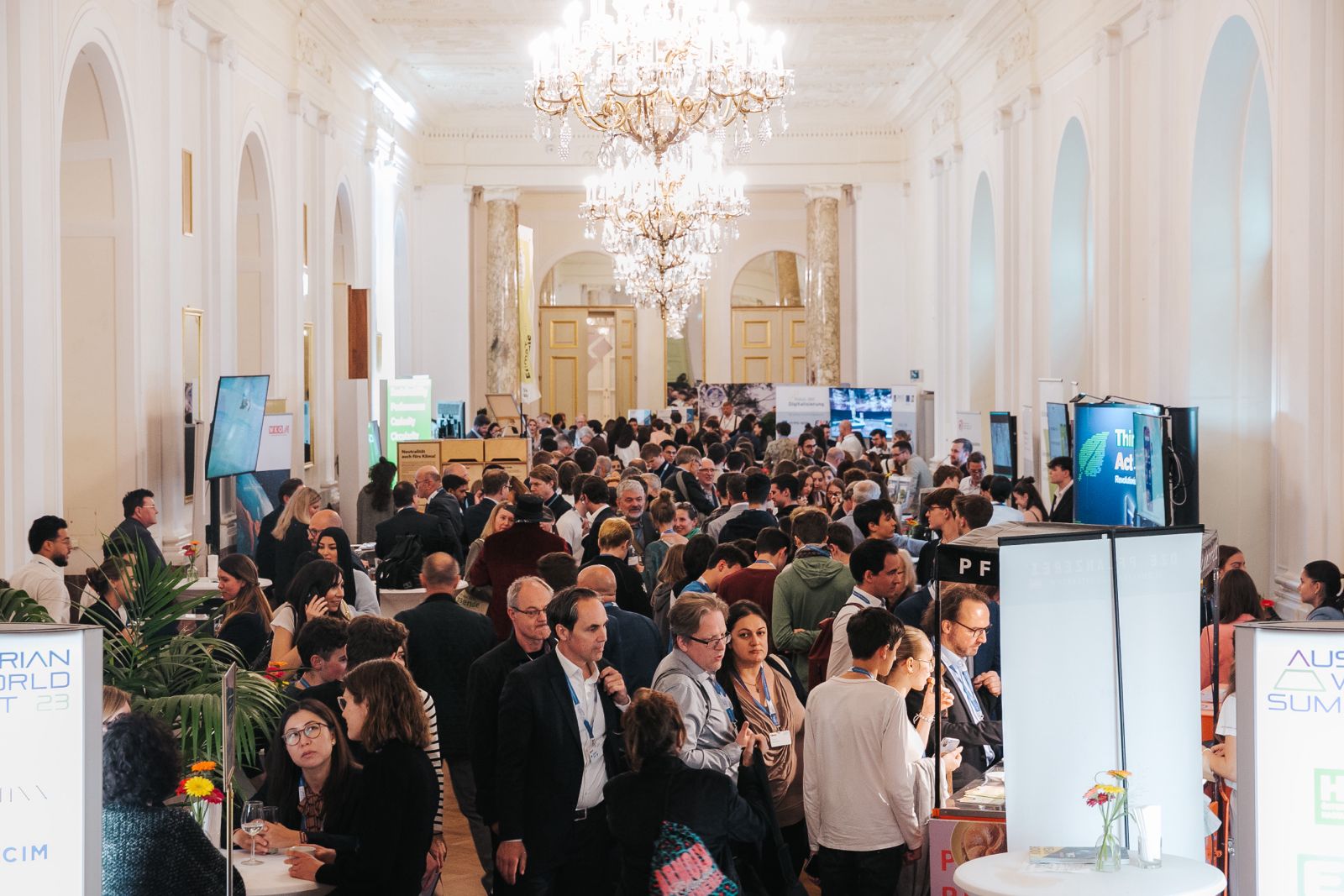
March 13, 2024
Schwarzenegger and Environmental Expo at AUSTRIAN WORLD SUMMIT 2024
For the first time, a dedicated environmental expo showcasing innovative solutions will accompany the climate conference on June 20th. On June 20, 2024, Arnold Schwarzenegger will convene his annual climate conference, the AUSTRIAN WORLD SUMMIT (AWS […]

January 19, 2024
Schwarzenegger’s Auction Raises 1,31 Million Euros for a Sustainable Future
“There are many things we can smile about tonight: the great food, the exceptional atmosphere, the lovely company, and of course, all of us giving back to change the world,” stated Arnold Schwarzenegger, extending a warm welcome to guests at the “Sp […]
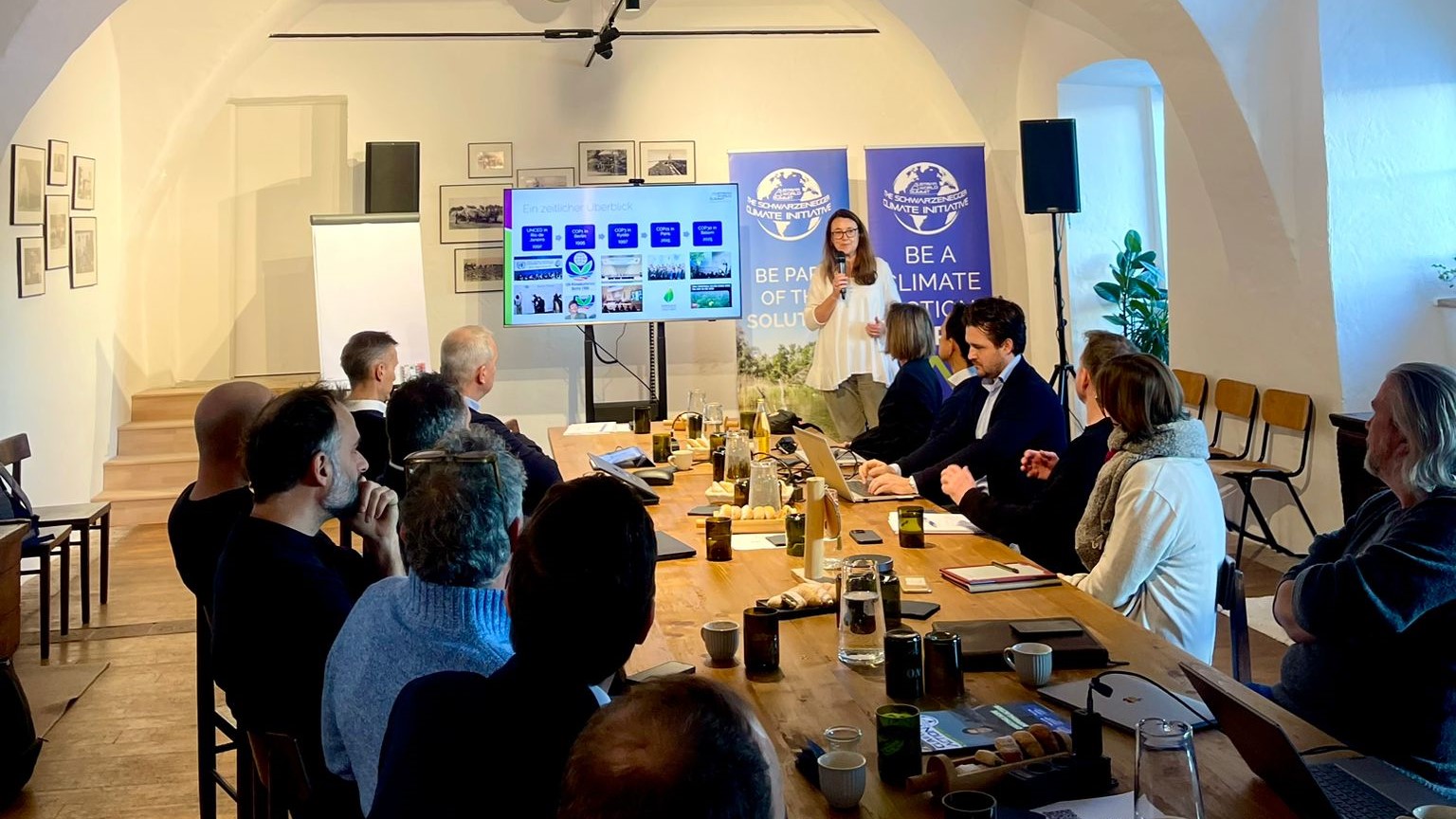
December 13, 2023
COP28 Info-Day at the Austrian World Summit Solutions Hub
On the occasion of the current UN climate conference in Dubai, the AWS Solutions Hub hosted a COP28 themed day at its newly renovated estate in Asparn an der Zaya. The event, marked by insightful presentations, interactive Q&A sessions, a live b […]
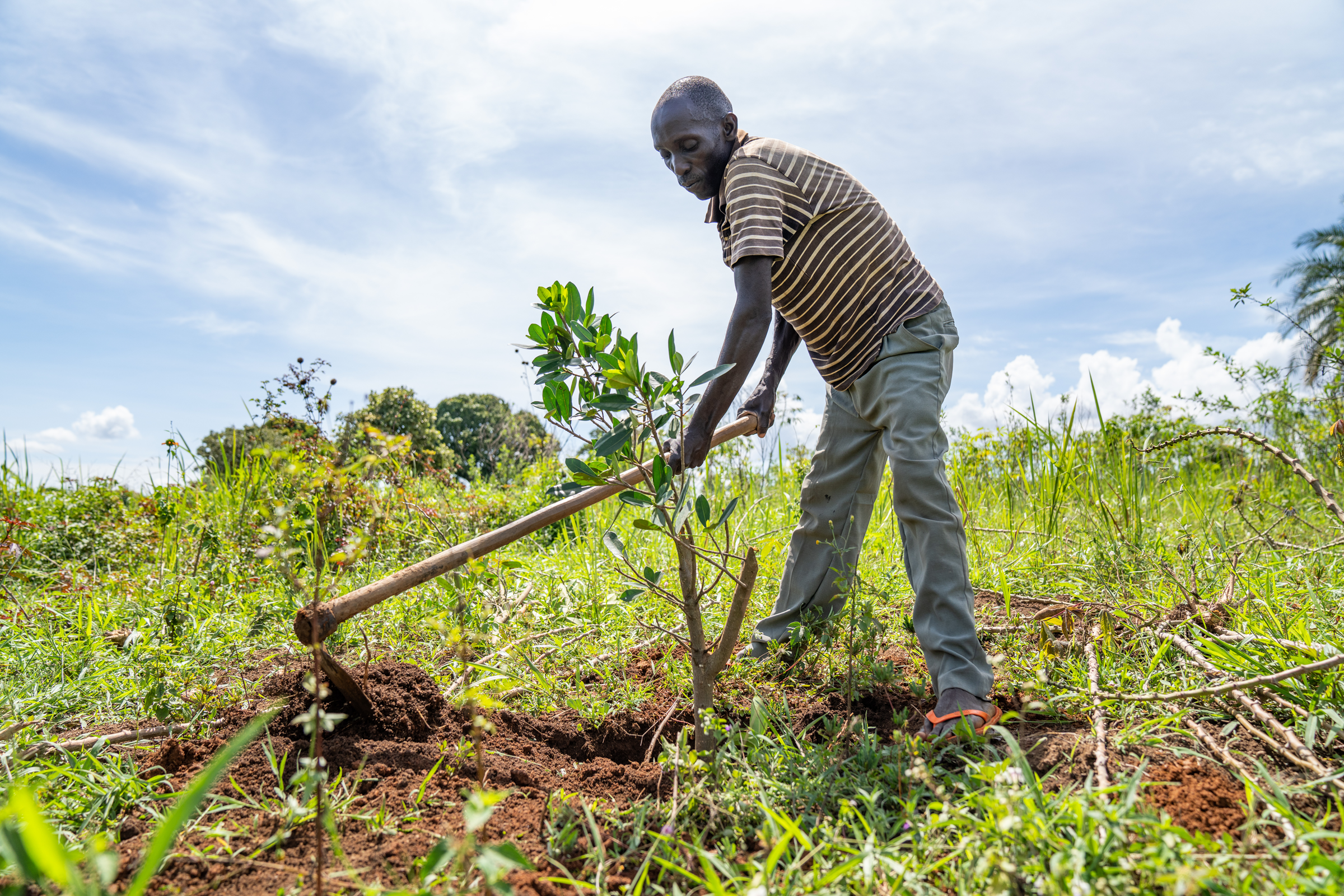
December 6, 2023
Preserving Nature and Tradition: The Mutuba Reforestation Project
We are thrilled to announce the successful conclusion of our three-year reforestation initiative in collaboration with the Jane Goodall Institute in Western Uganda. The project has not only preserved the Mutuba fig tree but also aimed to revitalize […]
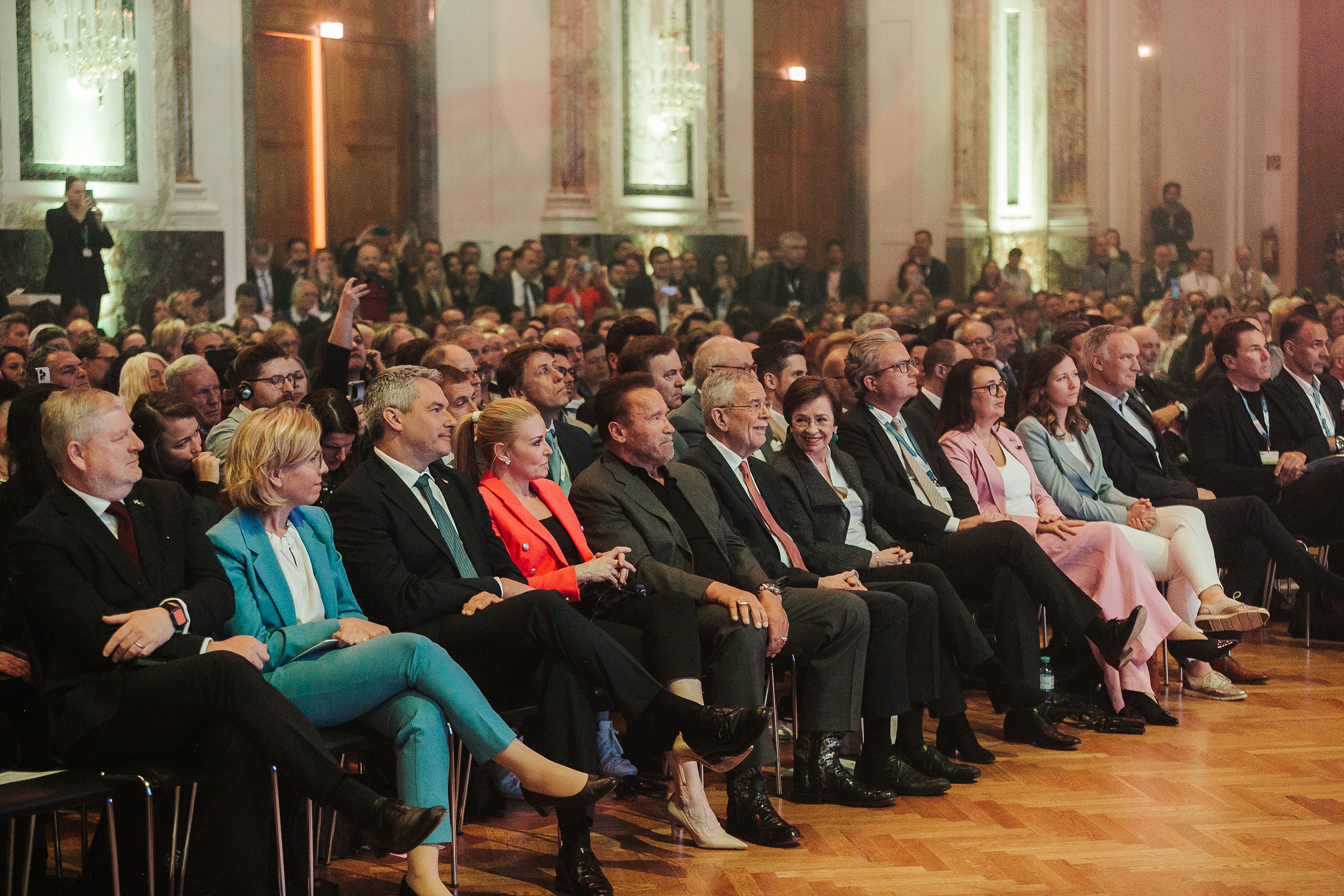
June 20, 2023
AUSTRIAN WORLD SUMMIT 2024 on June 20th
(Vienna, June 20, 2023) After the incredible success of this year’s AUSTRIAN WORLD SUMMIT, the date for next year’s environmental conference has been set. The 8th AUSTRIAN WOLRD SUMMIT will take place on June 20th, 2024, at the Hofburg Palace in Vie […]
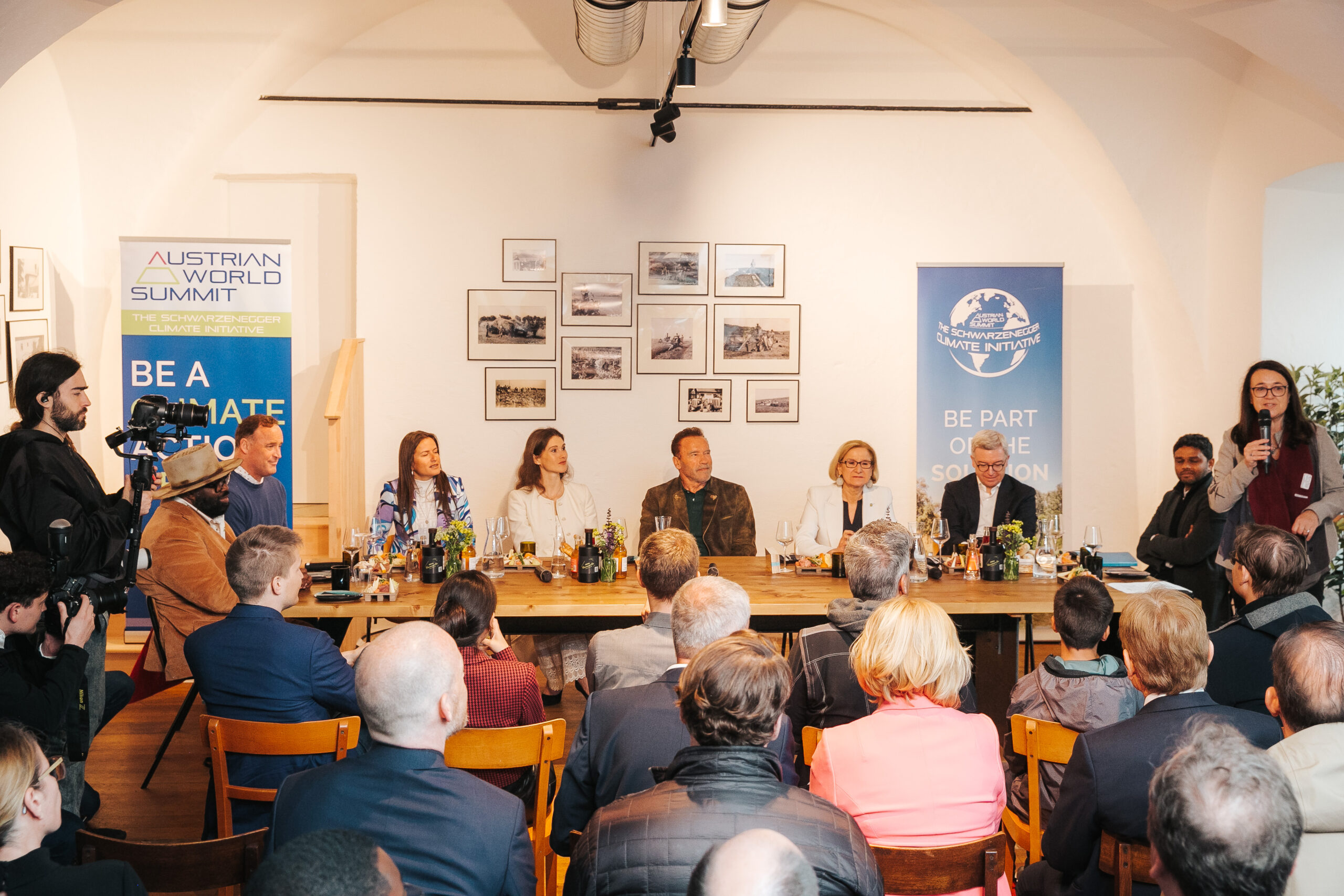
May 25, 2023
Arnold Schwarzenegger opens AUSTRIAN WORLD SUMMIT Solutions Hub
On May 17th 2023, Arnold Schwarzenegger and Monika Langthaler opened the AUSTRIAN WORLD SUMMIT Solutions Hub in Asparn an der Zaya. The new centre on the historic estate in the Weinviertel region of Lower Austria will become a hub for climate prote […]
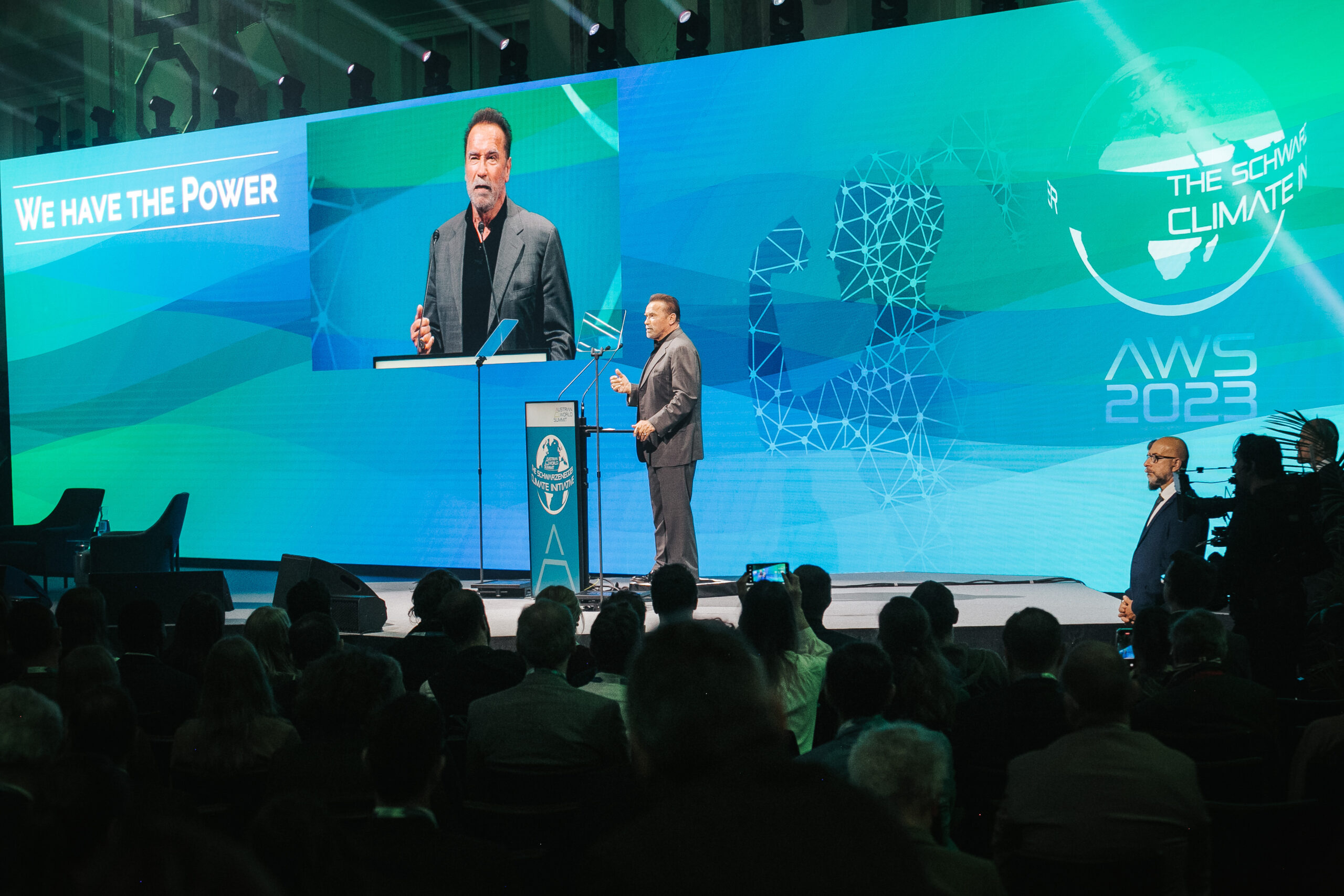
May 16, 2023
Arnold Schwarzenegger calls for new Environmentalism
AUSTRIAN WORLD SUMMIT: On Course for Change in Vienna’s Hofburg, Focusing on Climate Protection and Security “Times have changed, and we have to change with them.” host Arnold Schwarzenegger said in his opening speech at the AUSTRIAN WORLD SUMMIT, w […]

May 8, 2023
Arnold´s Stammtisch with José Andrés
Stammtisch is back! This time around, Arnold Schwarzenegger is joined by renowned chef and founder of World Central Kitchen, José Andrés. Together, they discuss the importance of nutrition, clean cooking, environmentalism, and the positive impact we […]
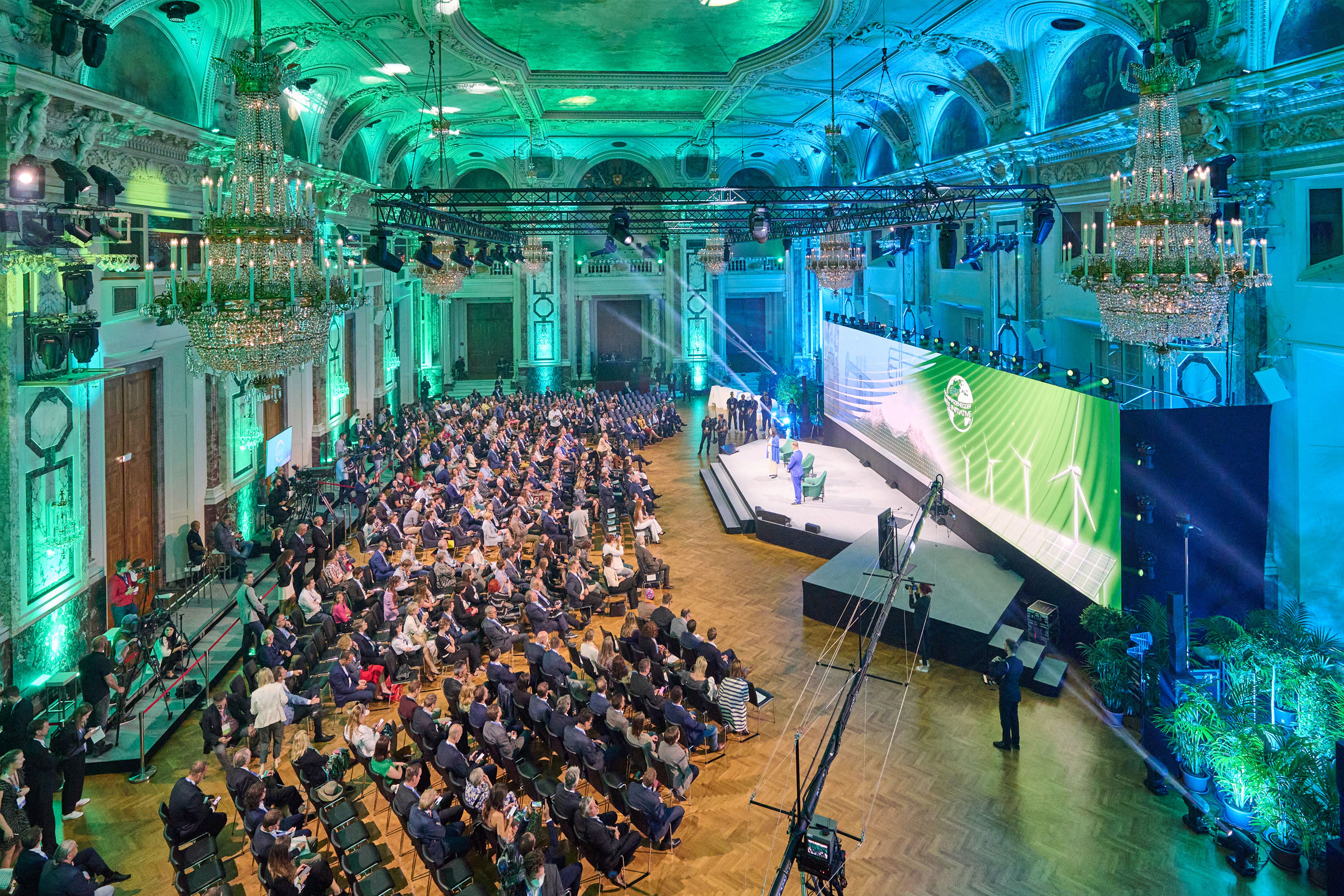
April 25, 2023
AUSTRIAN WORLD SUMMIT 2023
The AUSTRIAN WORLD SUMMIT is back! The theme of this year´s conference, hosted by Arnold Schwarzenegger, is “We Have the Power” and it will take place on May 16, 2023, at The Hofburg in Vienna. The focus will once again be on climate protection, esp […]
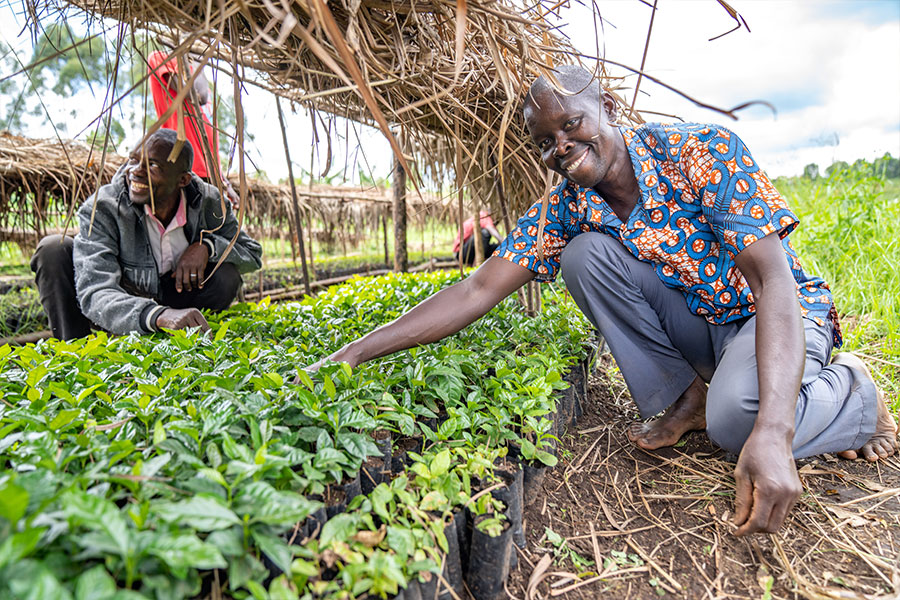
December 22, 2022
5000 Mutuba cuttings for 100 housholds
Our three-year joint Mutuba reforestation project with the Jane Goodall Institute Austria is entering its final year. A good opportunity to look back and see that we are on track with the implementation: This year 5000 Mutuba cuttings were procured, […]
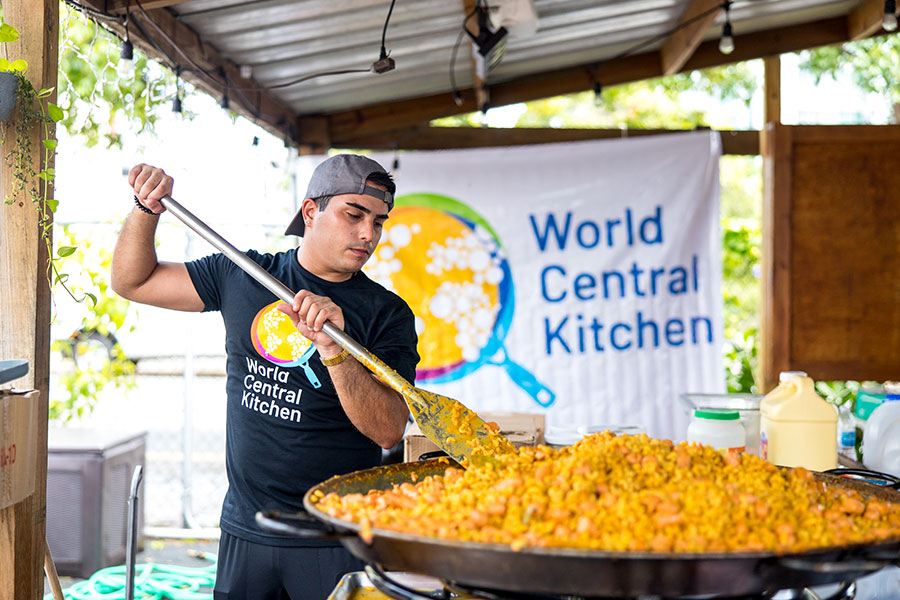
November 9, 2022
Cooking up Climate Action
With the money from the BAWAG Women’s Prize 2022, which Director Monika Langthaler was awarded, the Schwarzenegger Climate Initiative will support two impressive projects concerning the climate crisis and cooking. World Central Kitchen Extreme weath […]
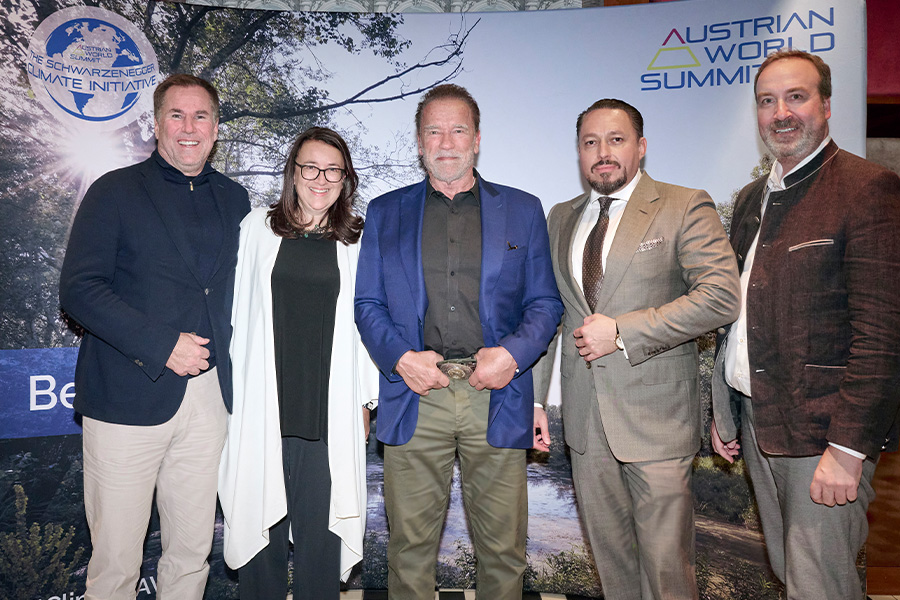
September 29, 2022
Dinner in the spirit of Climate Action
Arnold Schwarzenegger paid a short visit to his home country Austria for a dinner at Motto am Fluss in Vienna with representatives from the business community. The talks focused on the challenges in the fight against pollution and the climate crisis […]
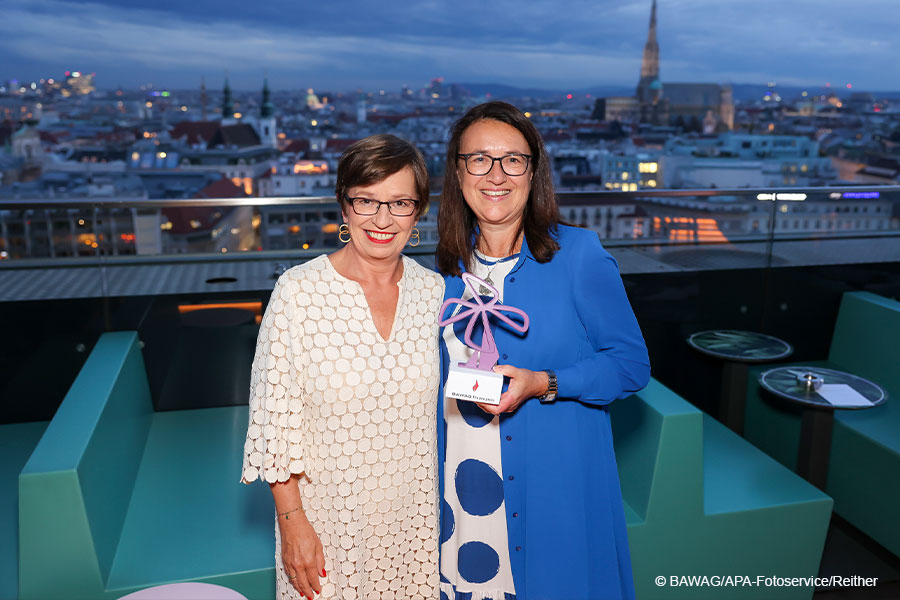
September 22, 2022
Monika Langthaler awarded 10th BAWAG Women’s Prize
Monika Langthaler, Director of the Schwarzenegger Climate Initiative gratefully accepted the annual BAWAG award last week. The prize, which is endowed with € 5,000, recognises outstanding achievements by women and special commitment to the positioni […]

July 29, 2022
AWS 22 Report now online
It´s a wrap on the AUSTRIAN WORLD SUMMIT 2022 and a lot of things were happening on stage and around the conference. In this year´s report you can read all about the summit, it´s guests and the take aways from the panel discussions. On June 14th, 20 […]
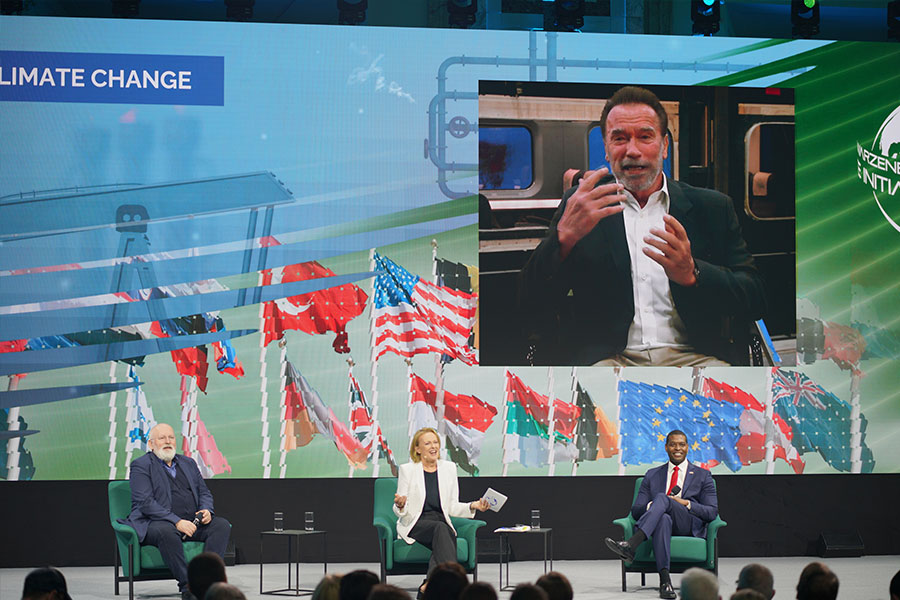
June 27, 2022
Schwarzenegger: Eliminate addiction to fossil fuels
Arnold Schwarzenegger hosted this year´s AUSTRIAN WORLD SUMMIT live from his filmset in Toronto, but his messages were very real: “We must do whatever it takes to eliminate our addiction to fossil fuels,” he emphasized in his opening speech and cond […]

June 24, 2022
AUSTRIAN WORLD SUMMIT 2022: Creating Hope – Inspiring Action
On June 14th 2022, Arnold Schwarzenegger hosted his climate conference, the AUSTRIAN WORLD SUMMIT, at the Hofburg in Vienna. Numerous prominent guests from politics, business, science and civil society highlighted the importance of climate protectio […]

March 3, 2022
E-fuels: Do they keep what they promise?
The idea is simple: Synthetic fuels would be produced using electricity. These so called e-fuels could operate in existing combustion engines without major problems. They could be distributed via the existing gas station network. Clean fuel without […]
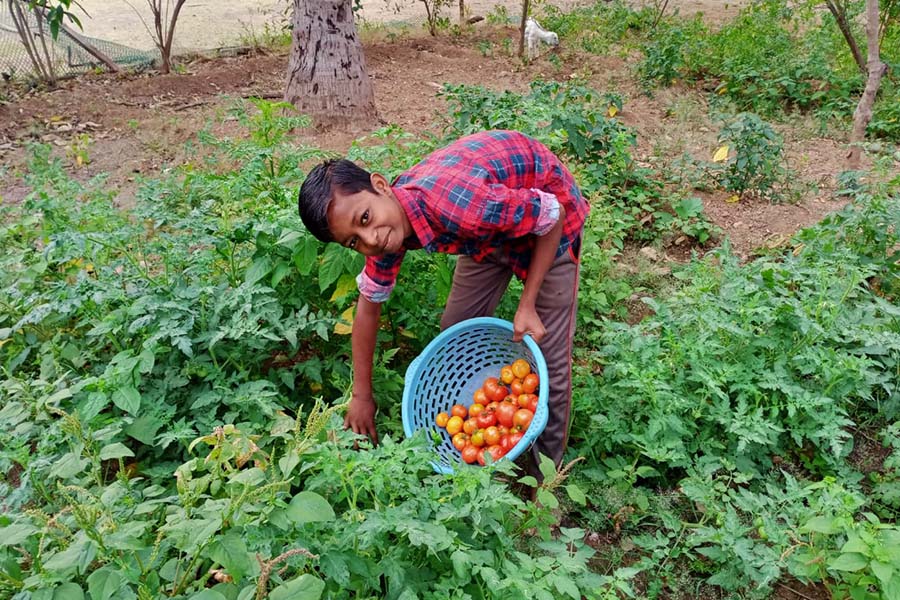
January 12, 2022
Support for new climate project in India
The people of Tamil Nadu in the south of India are feeling the harsh effects of climate change. Increased droughts and floods and the rise in agricultural pests are having a serious impact on the food supply. The Schwarzenegger Climate Initiative wi […]

September 28, 2021
Continued support for “Bosco Children”
“Bosco Children“ runs a center in Addis Abeba and gives street children shelter and guidance. There are an estimated 17,000 children that live unaccompanied in the Ethiopian capital. With the help of the ‘Schwarzenegger Climate Initiative’ and ‘Juge […]

August 9, 2021
Der grüne Terminator
Arnold Schwarzenegger war Mr. Universum, Schauspieler und Gouverneur von Kalifornien. Seine neue Rolle: Klimaaktivist mit Esel und Elektro-SUV. Ein Hausbesuch in Los Angeles. SPIEGEL: Als Sie vor 53 Jahren Österreich verließen, um eine Karriere in A […]
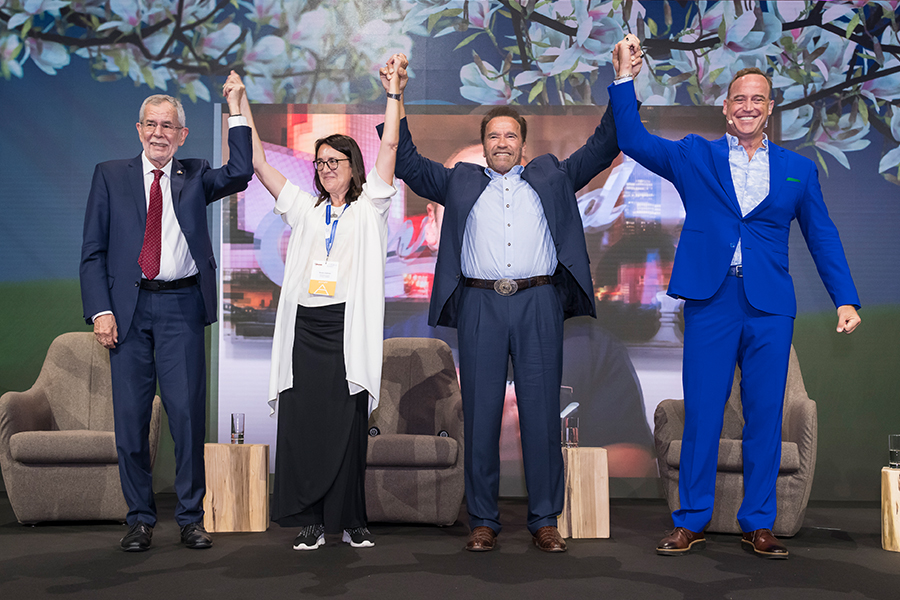
August 2, 2021
AWS 21 Report
The 5th AUSTRIAN WORLD SUMMIT on July 1st 2021 was a full success. Arnold Schwarzenegger returned to Vienna this year to attend his annual climate conference. Over the years it has grown to become one of the biggest environmental summits in the worl […]

April 13, 2021
Fast Fashion vs. Fair Fashion
The facts and figures are frightening. The fashion industry is – and very few people know this – the second largest polluter in the world. It is one of those industries in which consumption has grown rapidly in recent decades. About 60 percent more […]

February 4, 2021
Joe Biden’s Climate Action Team
The new US president Joe Biden moved fast on climate change policies as soon as he took office: first he initiated the United States’ re-entry into the Paris Climate Agreement, then he signed a climate-related executive order suspending new oil and […]
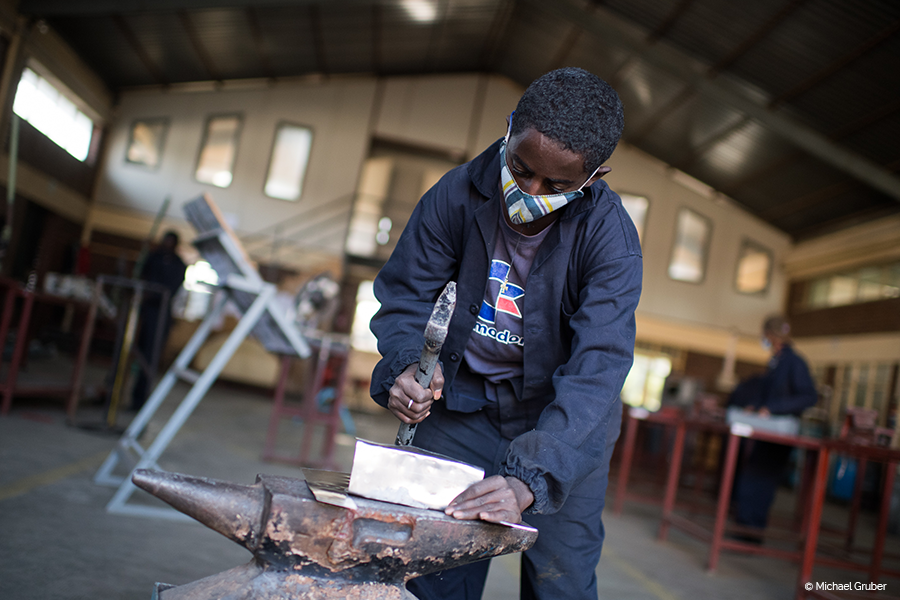
February 1, 2021
Bosco Children Center in Ethiopia
An aid project in Ethiopia by “Jugend Eine Welt” is making a sustainable impact: At the Bosco Children Center near the capital Addis Ababa, former street children are given a new perspective. They are not only given emotional support and social care […]
January 7, 2021
Arnold Schwarzenegger on why Republicans must stop Trump
It is time to end the president’s “stupid, crazy and evil” ploy to cling to power, says the former governor of California THE UNITED STATES OF AMERICA was my first love. I fell for this country long before I was lucky enough to live here. From the m […]

December 10, 2020
Mutuba Project: Reforestation in Uganda
The Schwarzenegger Climate Initiative has started a very special project in cooperation with the Jane Goodall Institute – Austria: Together we will support the reforestation of Mutuba trees in Uganda for three years. The fact that this project is no […]

September 17, 2020
AUSTRIAN WORLD SUMMIT 2020
On September 17, 2020 the fourth AUSTRIAN WORLD SUMMIT took place despite the challenges posed by Covid-19. With a mixture of analog and digital elements, the summit set new standards and new viewer records. Arnold Schwarzenegger joined the entire 3 […]

July 28, 2020
New report focusing on forests
Our 2020 Special Report – the third in this series already – features a broad variety of international showcase projects and sustainable business models that contribute to intact forests in very different ways. The showcases range from conservation […]

May 25, 2020
Climate crisis and Covid-19: addressing both crises at once
The coronavirus (COVID-19) is disruptive for the global economy and devastating for many people and their livelihoods, but we cannot take our attention away from the climate crisis. Rather we must recognize and analyze the parallels and connections […]
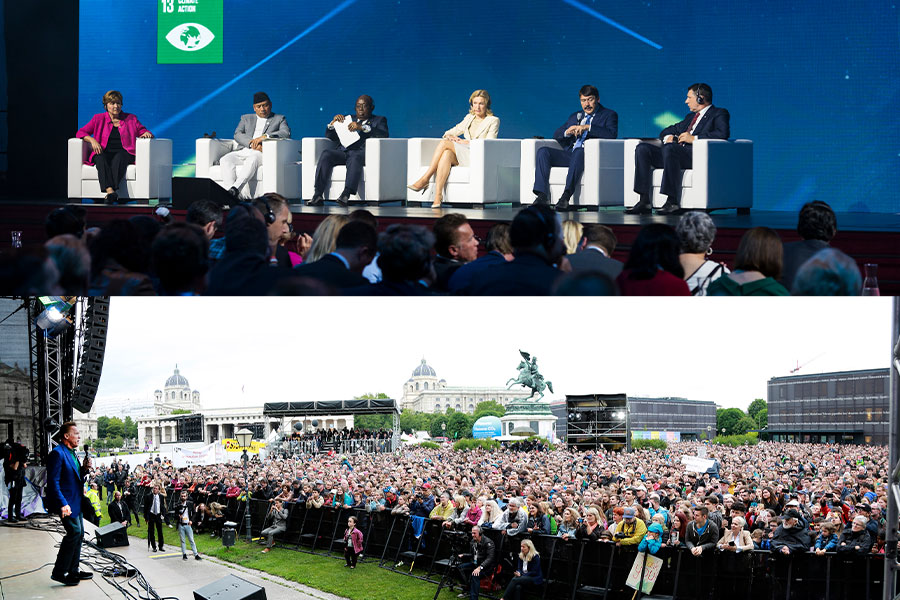
March 23, 2020
AWS and CLIMATE KIRTAG postponed
Due to the current situation concerning the worldwide outbreak of the coronavirus (COVID-19), the AUSTRIAN WORLD SUMMIT and the CLIMATE KIRTAG are postponed to September 17, 2020. Everyone’s health comes first and has the highest priority. The motto […]

January 23, 2020
Charity Auction: 900.000€ for climate protection
“Don´t listen to the naysayers! People said to me last year that another event in Kitzbühel won´t work – that there are already too many parties and we didn’t need another fundraiser. And today, we are completely sold out and we are raising a fortun […]

December 5, 2019
18.500€ for climate action projects
Many friends and supporters of the AUSTRIAN WORLD SUMMIT followed yesterday our invitation to our first charity auction at the Habibi & Hawara in Vienna – among others Federal President Alexander Van der Bellen as well as ski legends Franz Klamm […]
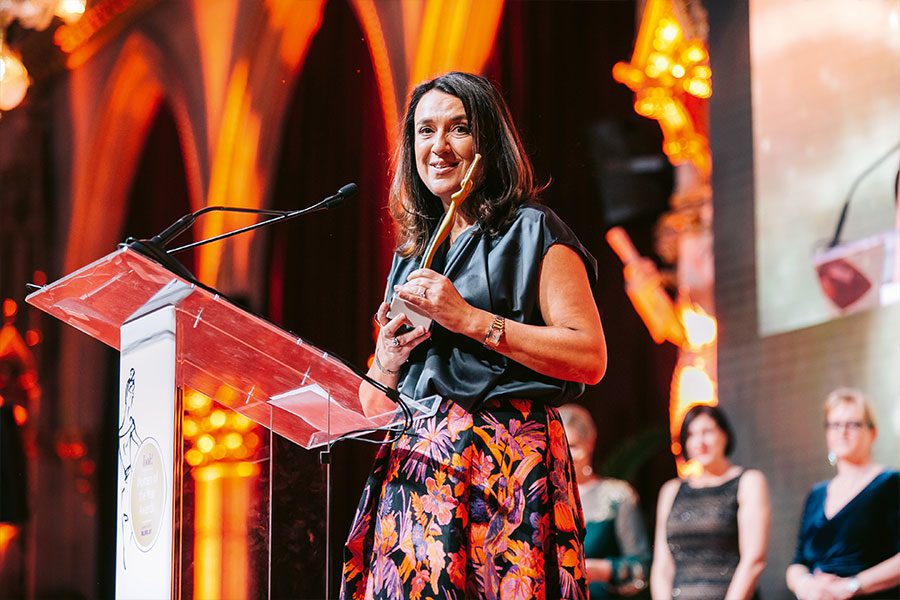
November 28, 2019
Monika Langthaler is “Woman of the Year”
Monika Langthaler was awarded as “Woman of the Year” by the Austrian magazine Look! for her 30 years of commitment to climate protection. The Director of the AUSTRIAN WORLD SUMMIT was very pleased about this great honor and underlined in her accepta […]
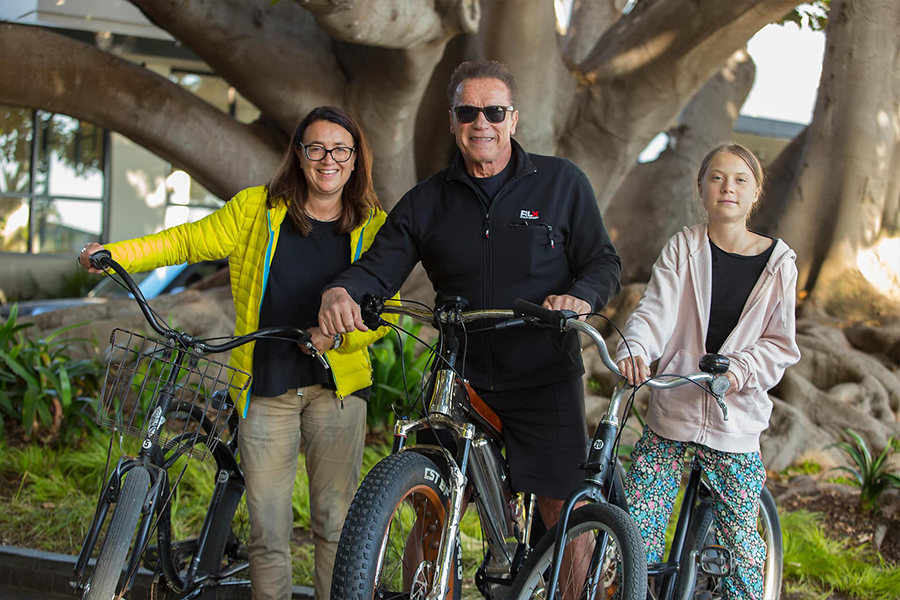
November 5, 2019
A bike ride with Climate Action Heroes
It was a very special experience for Monika Langthaler, Director of AUSTRIAN WORLD SUMMIT, to meet Governor Arnold Schwarzenegger and climate activist Greta Thunberg in Los Angeles and go for a bike ride in Santa Monica with them. Together they disc […]
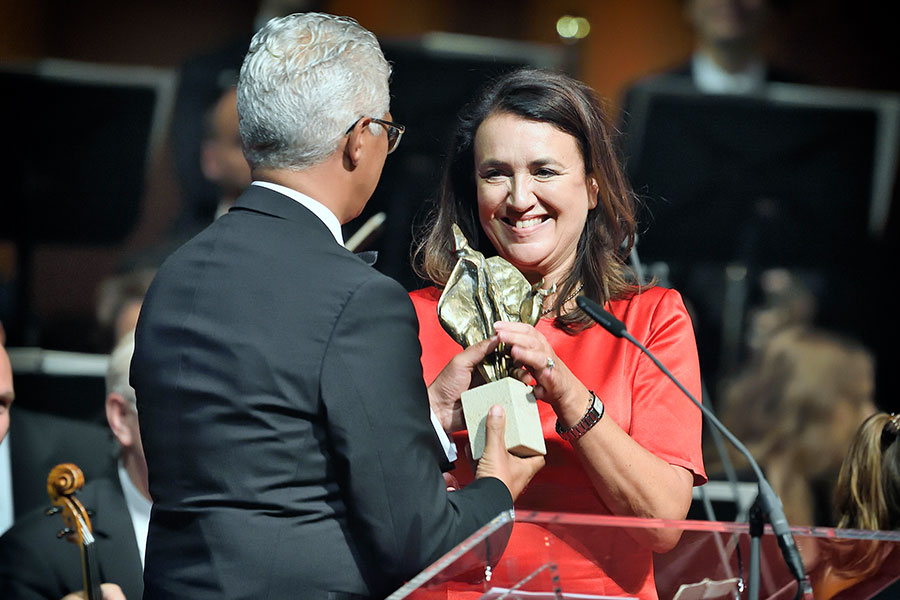
October 22, 2019
European Culture Prize
We are thankful and proud, that the AUSTRIAN WORLD SUMMIT got honoured with one of the most important awards in Europe. On October 20th, Monika Langthaler Director of The Schwarzenegger Climate Initiative, received on behalf of Arnold Schwarzenegger […]
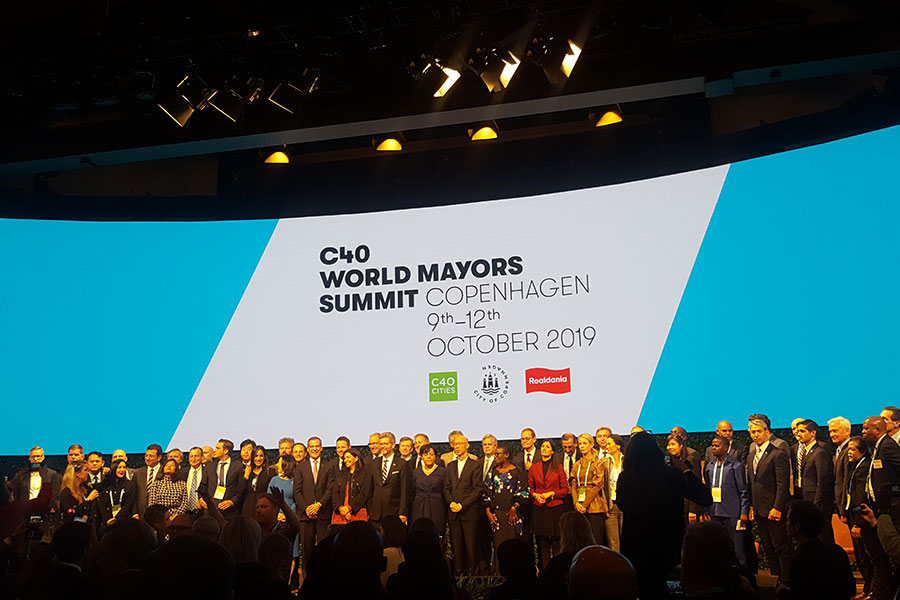
October 16, 2019
Visiting the C40 Mayors Summit
Last week The Schwarzenegger Climate Initiative visited the C40 Mayors Summit in Copenhagen, Denmark. This Summit highlighted examples of how cities are already fulfilling their strong commitments and accelerating the bold climate solutions needed f […]
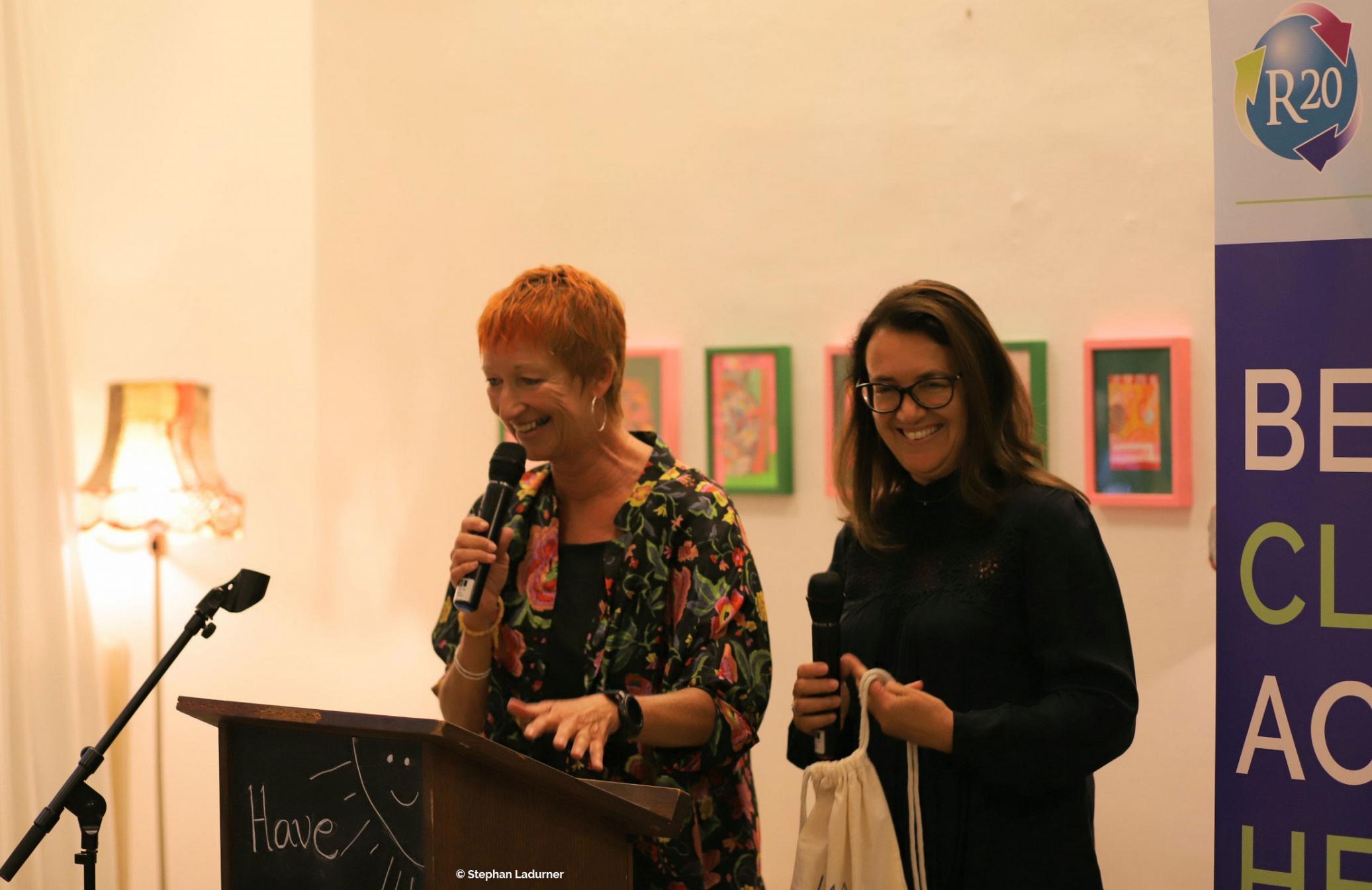
September 5, 2019
Presentation of the book Heißzeit 51
A “hot” track – and it leads to the topic of climate change! Yesterday (Sept. 4, 2019) the well-known Austrian crime writer Eva Rossmann presented her latest work together with The Schwarzenegger Climate Initiative Director Monika Langthaler. In “He […]
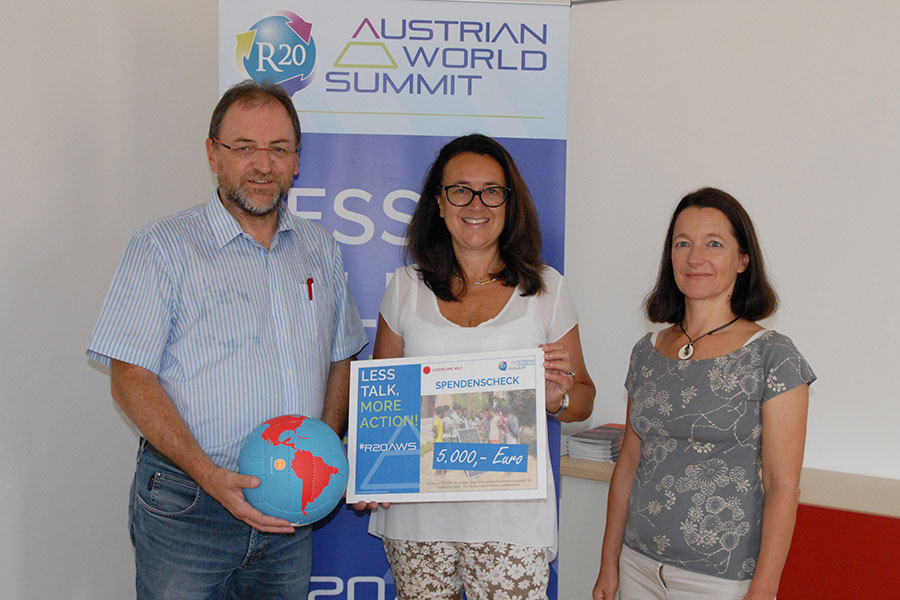
August 8, 2019
Donation for “Jugend eine Welt”
Today The Schwarzenegger Climate Initiative Director Monika Langthaler handed over a donation cheque of 5.000 Euro to Reinhard Heiserer, CEO Jugend eine Welt, for a very special project: “Solar Skills and Environmental Education”, which sets up sola […]
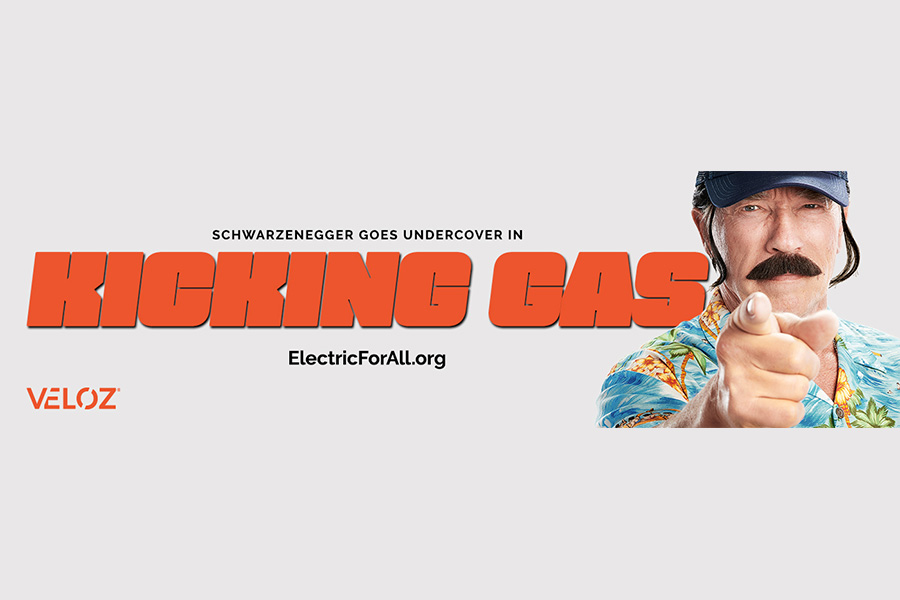
June 27, 2019
Schwarzenegger is back – as Howard Kleiner
What a funny and crazy way Arnold Schwarzenegger promotes electromobility: not with a moralizing undertone, but with humor! In the short movie Kicking Gas, Schwarzenegger goes undercover as Howard Kleiner, a frustrated car salesman to help non-profi […]
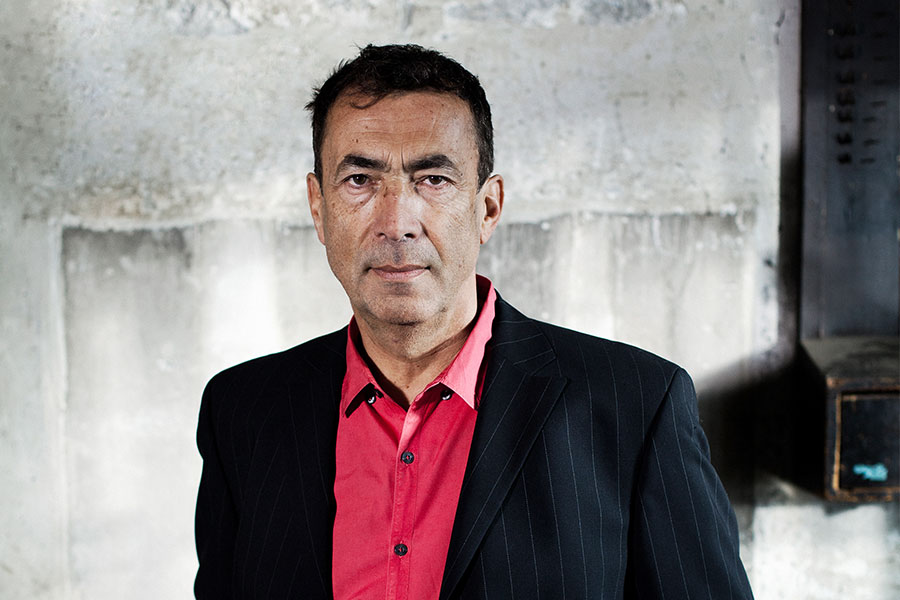
May 21, 2019
Hubert von Goisern as special guest at the CLIMATE KIRTAG
We are very happy to announce that Hubert von Goisern will also be at our CLIMATE KIRTAG on the 28th of May as a special guest on stage alongside Arnold Schwarzenegger, Greta Thunberg, Aksel Lund Svindal, Conchita Wurst and Pizzera&Jaus. Everyon […]

May 17, 2019
The view from outer space
“We have a beautiful planet. We should feel very fortunate, but some parts are visibly polluted from space. We are alone in the world as the only nation that denies climate change.” At this year’s AUSTRIAN WORLD SUMMIT, the US astronaut Scott Kelly […]
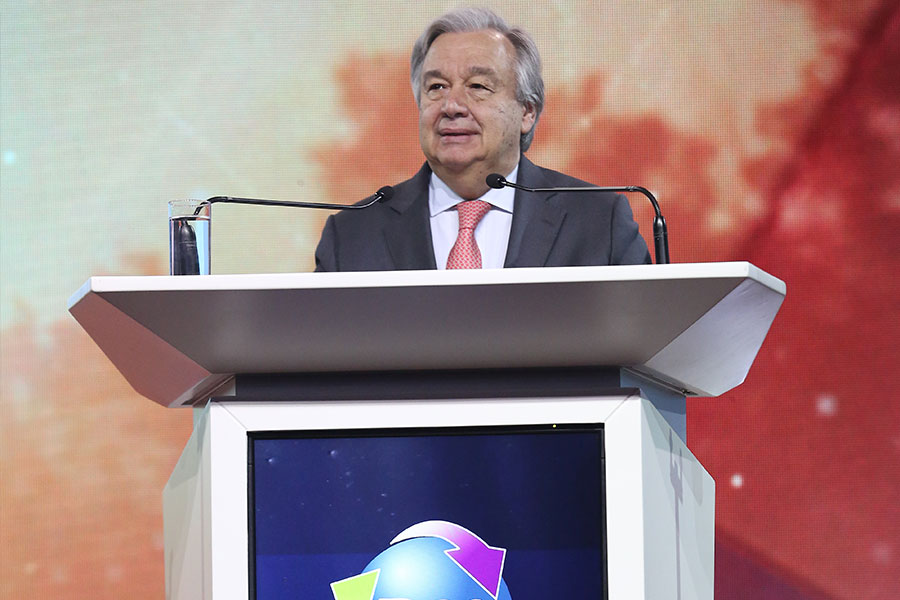
May 3, 2019
Antonio Guterres comes to AWS in Vienna
It is a great honor for us that UN Secretary-General António Guterres will visit the AUSTRIAN WORLD SUMMIT for the second time. In the past year he has made it very clear that fighting against climate change is one of his top priorities. António Gut […]

April 24, 2019
New Bipartisan Podcast on Energy and the Environment
The Schwarzenegger Institute has teamed up with “Political Climate,” a bipartisan podcast exploring energy and environmental issues in America. After gaining listenership from across party lines including industry leaders, congressmen, activists and […]
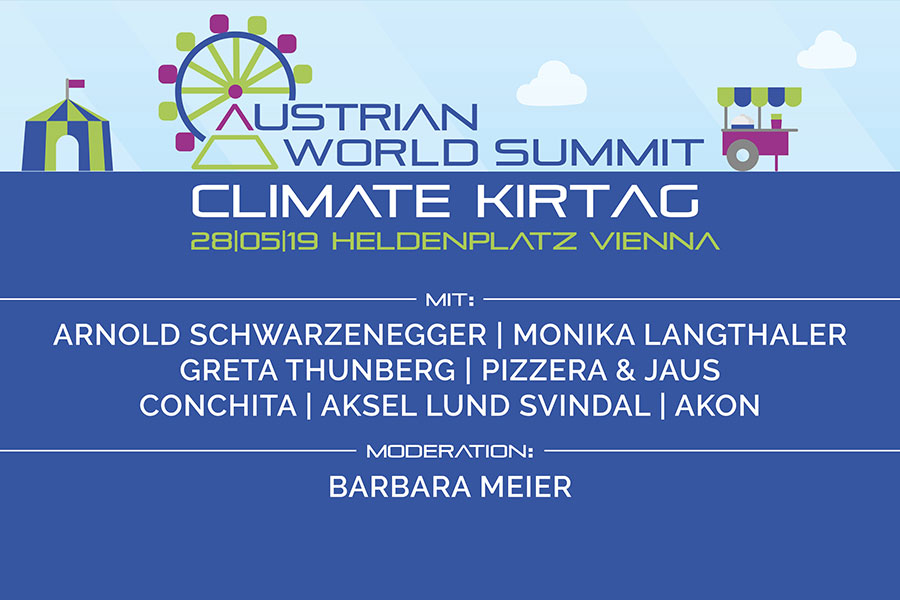
March 7, 2019
Climate Kirtag 28|5
The first CLIMATE KIRTAG will take place in the frame of the AUSTRIAN WORLD SUMMIT on May 28th, starting at 3 pm at Heldenplatz. Every individual interested in world music and climate protection is warmly invited to attend. Guests will include Arnol […]
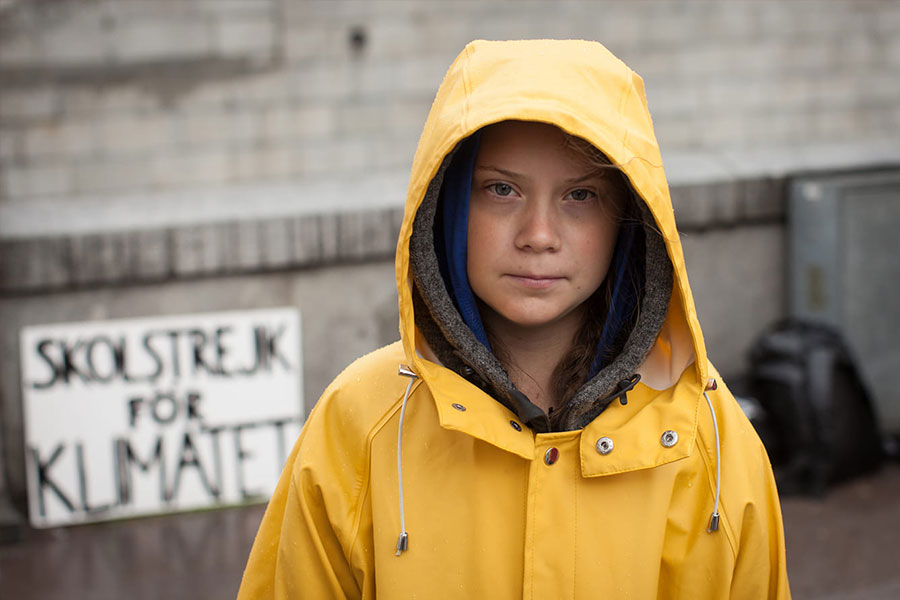
March 3, 2019
Greta Thunberg
“Instead of looking for hope, look for action. We can´t save the world by playing by the rules, because the rules have to be changed.” Thousands of students from all over the world followed Greta Thunberg´s example and set their governments under pr […]

March 1, 2019
Release of the AWS Annual Report 2018
The outcome and impacts left by the AUSTRIAN WORLD SUMMIT initiative last year were wide-ranging. The Annual Report 2018 showcases not only the results and publications of the AUSTRIAN WORLD SUMMIT 2018 but also diverse activities with our network o […]
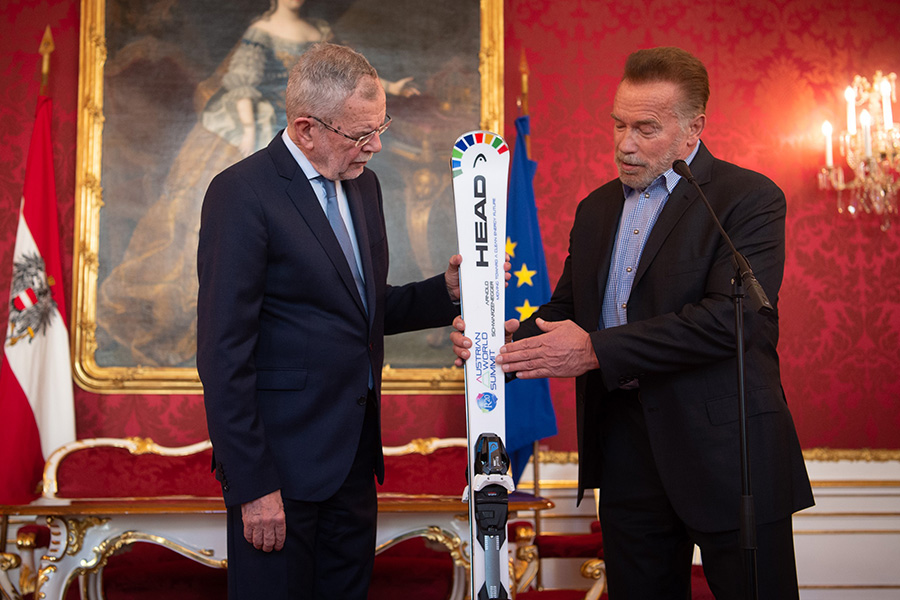
January 30, 2019
Bilateral Meeting at the Hofburg
Arnold Schwarzenegger and the Federal President of Austria Alexander Van der Bellen join forces to promote more action to step up climate ambition. In December they were both at the COP24 in Katowice, now they stand side by side again for the AUSTRI […]

January 29, 2019
Arnold Schwarzenegger meets Chancellor Sebastian Kurz
After promoting climate protection together with ski aces in Kitzbühel, Arnold Schwarzenegger presented Austrian Chancellor Sebastian Kurz with the special AUSTRIAN WORLD SUMMIT skis to thank him for his great support for the third AUSTRIAN WORLD SU […]

January 26, 2019
New skis for Arnold Schwarzenegger
Arnold Schwarzenegger, a big fan of Kitzbühel (Austria), jumped at the opportunity to visit the Hahnenkamm Races again this year together with Heather Milligan. He was particularly excited to further his commitment to environmental protection togeth […]
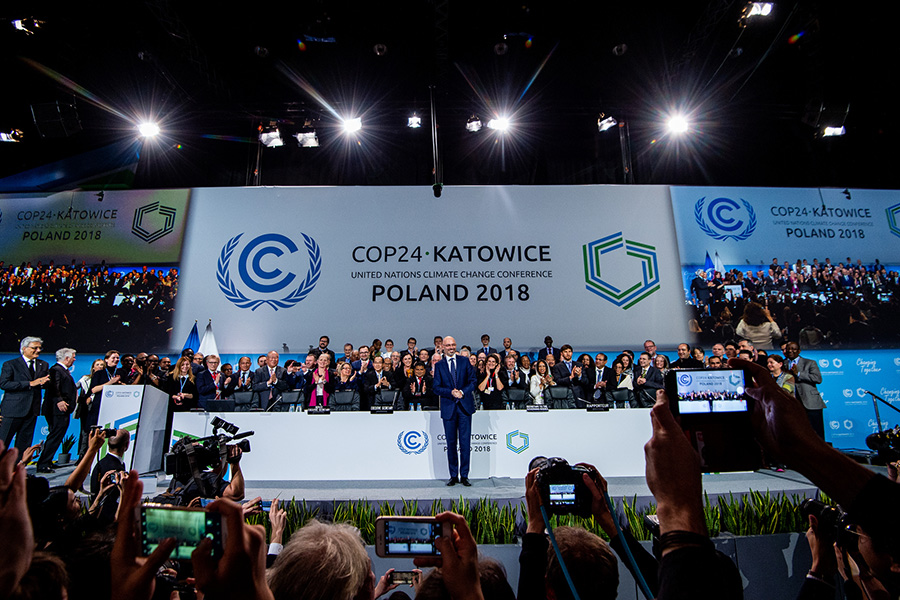
December 17, 2018
“Katowice Climate Package” agreed at COP24
The UN Climate Conference (COP24) in Katowice, Poland, has achieved its determined goal: on December 15th, the delegates finally adopted unanimously a rulebook for the Paris Agreement. In addition, the almost 200 states agreed on ways to implement t […]
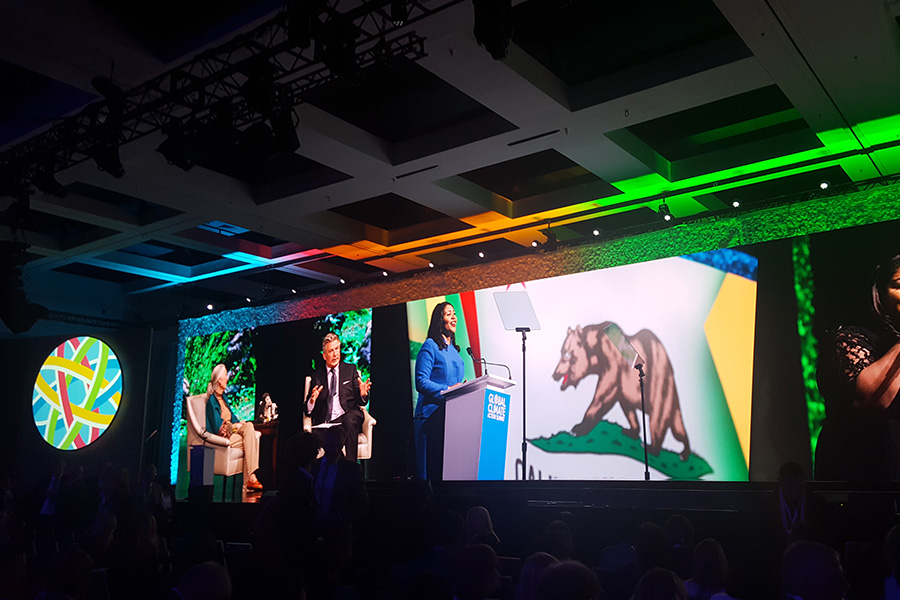
September 17, 2018
A Call to Action from California
The Global Climate Action Summit (GCAS) in San Francisco for business, city and state leaders closed with a call on national governments to increase their pledges to the Paris Agreement. Subnational actors asked nations to update their pledges to re […]

September 14, 2018
Road to Katowice and beyond!
The AUSTRIAN WORLD SUMMIT is part of an ever-growing community. We have outlined the most important milestones of this global process in a timeline up to our next conference on 28 May 2019 – also to clearly emphasize that the AUSTRIAN WORLD SUMMIT i […]

July 15, 2018
Donation “Hope For Batwa Children”
We are happy to support a very special project of naturalist and chimpanzee specialist Dr. Jane Goodall and the Jane Goodall Institut – Austria: „Hope for Batwa Children“. At the beginning of her work, the focus of Jane Goodall was on research into […]
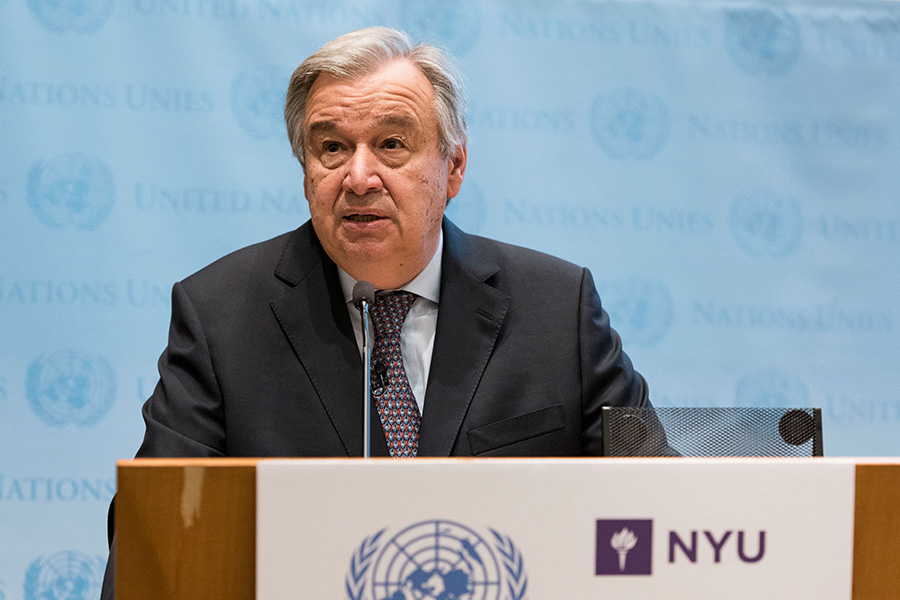
April 30, 2018
Antonio Guterres comes to Vienna
It is a special honor for us that António Guterres visits Vienna for the first time in his function as UN Secretary-General on the occasion of the AUSTRIAN WORLD SUMMIT. Joining the AUSTRIAN WORLD SUMMIT is a clear commitment for climate action. Ant […]

April 26, 2018
AUSTRIAN WORLD SUMMIT Tram
Transportation is one of the largest and a growing sector for increasing energy demand and CO2-emissions: with a share of 29 percent, it contributes significantly to greenhouse gas emissions in Austria. In the EU is about 25 percent, globally the sh […]
That was our amazing Special Dinner for Climate Action
Schwarzenegger Climate Initiative Auction raised 1.3 Million – WE ARE UNSTOPPABLE
Thank you from Arnold and the whole SCI-Team!
AUSTRIAN WORLD SUMMIT 2025
UNITE IN ACTION – TERMINATE POLLUTION
On June 3, 2025, Vienna once again hosted one of the world’s most influential climate conferences – the AUSTRIAN WORLD SUMMIT (AWS). In its ninth year, the event was organized by the Schwarzenegger Climate Initiative and proudly held under the patronage of Austrian President Alexander Van der Bellen.
Arnold Schwarzenegger:
“Our motto this year was crystal clear: Unite in Action – Terminate Pollution. The AWS was more than just a conference—it was a driving force for solutions and progress. Leaders from all over the world came together in Vienna to accelerate real change.”
Pump for the Planet
We engage in exercise to strengthen our bodies and enrich our health. However, beyond our personal wellness, the vitality of our environment is equally essential to our collective well-being. Therefore, it is imperative for each of us to actively engage in solutions and advocate for the preservation of our environment.
This workout offers you the opportunity to integrate environmentally friendly habits into your everyday life, step by step, week by week, and explains why every contribution counts.
Much like Arnold Schwarzenegger‘s advice for newcomers to the world of fitness, his words are equally applicable to our environmental pursuits: “My advice to beginners is simple: begin. And don‘t stop until it becomes a routine. For many people, the first step is the hardest. So, find something, anything, that you can do and keep at it.” Check out the video below for more from Arnold Schwarzenegger!

You want to be part
of the solution?
Start now by subscribing and finding out more about the Schwarzenegger Climate Initiative, the AUSTRIAN WORLD SUMMIT and the many solutions that can positively affect our future.
Your e-mail address is only used to send you our newsletter and information about the activities of The Schwarzenegger Climate Initiative. You can always use the unsubscribe link included in the newsletter.
